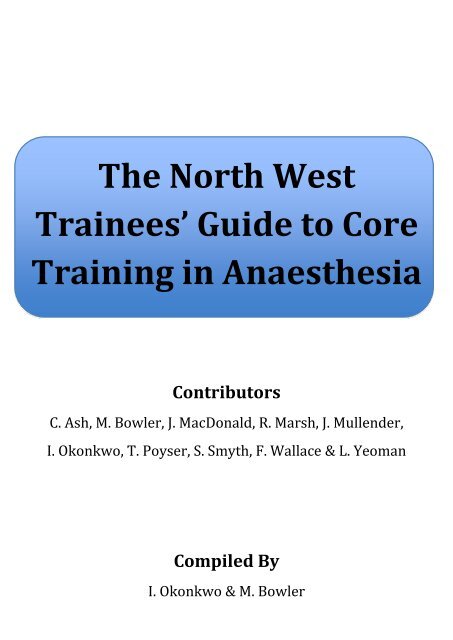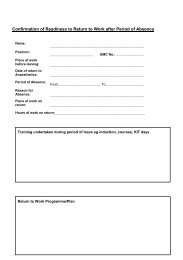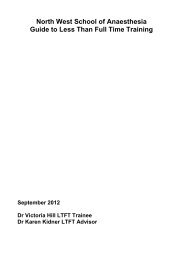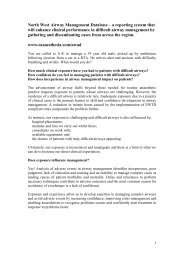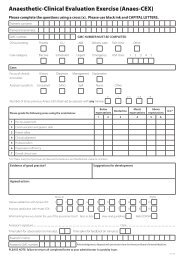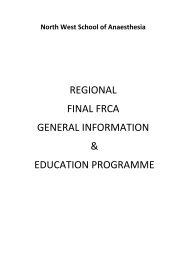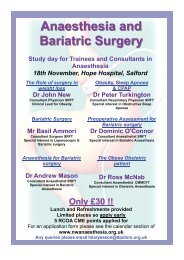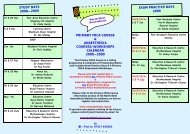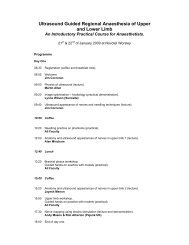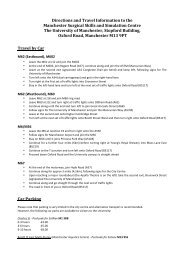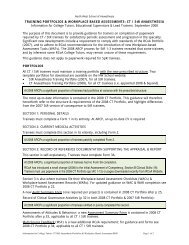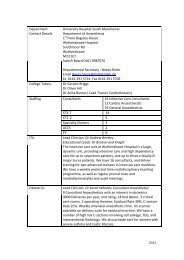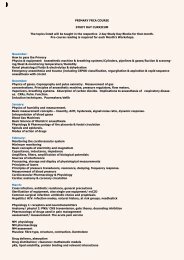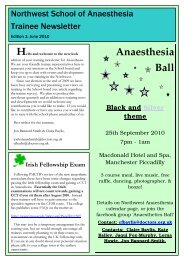nw trainees guide to core training - North West School of Anaesthesia
nw trainees guide to core training - North West School of Anaesthesia
nw trainees guide to core training - North West School of Anaesthesia
You also want an ePaper? Increase the reach of your titles
YUMPU automatically turns print PDFs into web optimized ePapers that Google loves.
The <strong>North</strong> <strong>West</strong><br />
Trainees’ Guide <strong>to</strong> Core<br />
Training in <strong>Anaesthesia</strong><br />
Contribu<strong>to</strong>rs<br />
C. Ash, M. Bowler, J. MacDonald, R. Marsh, J. Mullender,<br />
I. Okonkwo, T. Poyser, S. Smyth, F. Wallace & L. Yeoman<br />
Compiled By<br />
I. Okonkwo & M. Bowler
Introduction<br />
The first two years <strong>of</strong> anaesthesia can be challenging. Many aspects <strong>of</strong> <strong>core</strong> <strong>training</strong> will be very different <strong>to</strong> your<br />
previous clinical experiences and it isn’t uncommon <strong>to</strong> feel uncertain or like a fish out <strong>of</strong> water. This <strong>guide</strong> has been<br />
written by <strong>core</strong> <strong>trainees</strong> <strong>to</strong> help facilitate your journey through CT1 and CT2. It isn’t a replacement <strong>of</strong> the literature<br />
or guidance provided by your supervisors/the college/deanery/books/other organisations. We have included hints &<br />
tips, and hopefully definitive answers <strong>to</strong> some <strong>of</strong> the questions that arise regarding <strong>training</strong>, study leave, paperwork,<br />
logbook etc. We hope that this <strong>guide</strong> will act as a useful point <strong>of</strong> reference as the relevance <strong>of</strong> the sections change<br />
as you progress through the next two years <strong>of</strong> <strong>training</strong>.<br />
Contents<br />
Page<br />
1. Who’s Who In the <strong>North</strong> <strong>West</strong> <strong>School</strong> <strong>of</strong> <strong>Anaesthesia</strong> 2<br />
2. Core Training: 4<br />
- The Major Miles<strong>to</strong>nes<br />
- The New Starter Period & Months 6-24<br />
3. ACCS Anaesthetics: Differences Months 6-24 9<br />
4. The Annual Review <strong>of</strong> Competency Progression 10<br />
5. Audit 12<br />
6. Annual Trainee Events 12<br />
7. Curriculum & Assessments 13<br />
- Guide <strong>to</strong> getting the most out <strong>of</strong> them<br />
8. The E-portfolio 15<br />
9. Teaching 16<br />
- Post Primary Teaching<br />
10. The Primary FRCA Exam 18<br />
11. ST3 Applications 22<br />
- Dual & Single Accreditation: ICM, <strong>Anaesthesia</strong><br />
12. Failure <strong>to</strong> Achieve the Primary FRCA Exam 24<br />
13. Housekeeping 25<br />
- Study Leave<br />
- Annual Leave<br />
- Long Term Sickness<br />
- Your Travel Entitlement<br />
14. Booklist 27<br />
15. Websites 30<br />
16. Appendix 31<br />
RCOA 2010 Curriculum: Basic Level Training 1
Who’s Who in the <strong>North</strong> <strong>West</strong> <strong>School</strong> <strong>of</strong> <strong>Anaesthesia</strong><br />
The Specialist Training Committee<br />
Anaesthetic <strong>training</strong> is organised and delivered by the Specialist Training Committee (STC). This board is made up <strong>of</strong><br />
consultants from each hospital, some <strong>of</strong> whom represent the Royal College <strong>of</strong> Anaesthetists and Intensive Care<br />
Society, <strong>trainees</strong> and deanery management. It meets on a quarterly basis <strong>to</strong> provide guidance and implement the<br />
standards <strong>of</strong> <strong>training</strong>, as set out by the Royal College <strong>of</strong> Anaesthetists (RCOA). Member Include:<br />
*See figure 1, page 3 for the STC Consultants’ contact details .<br />
The Primary Course Administra<strong>to</strong>r<br />
Janet Coulson, University Hospital <strong>of</strong> South Manchester NHS Foundation Trust<br />
Janet.coulson@uhsm.nhs.uk; Tel: 07517456401<br />
Janet organises the administration and delivery <strong>of</strong> the Primary FRCA and Anaesthetic Courses within the Region. You must<br />
contact her in order <strong>to</strong> register for your Primary FRCA courses throughout CT1 & CT2.<br />
Education Administra<strong>to</strong>rs<br />
Liz Campbell, NHS <strong>North</strong> <strong>West</strong> Offices, Three Piccadilly Place<br />
E.Campbell@NWpgmd.nhs.uk; Tel: 44 (0)161 625 7675<br />
Organises the administration <strong>of</strong> aspects <strong>of</strong> ACCS and Anaesthetic Core <strong>training</strong> & are a useful source for ARCP information.<br />
To Core Training Representative<br />
Elections tbc.<br />
Interim Rep: Dr. Ijeoma Okonkwo, ST3 in <strong>Anaesthesia</strong>, Royal Pres<strong>to</strong>n Hospital<br />
ijeomaokonkwo1@gmail.com<br />
The CTR represents the interests and views <strong>of</strong> the <strong>core</strong> <strong>trainees</strong> on the STC. It is helpful <strong>to</strong> let them know <strong>of</strong> your concerns<br />
and problems that you experience with teaching/<strong>training</strong> so that they can feedback <strong>to</strong> the STC.<br />
Speciality <strong>School</strong>s Manager for <strong>Anaesthesia</strong><br />
Jennifer Smith, NHS <strong>North</strong> <strong>West</strong> Offices, Three Piccadilly Place<br />
j.smith@<strong>nw</strong>pgmd.nhs.uk; Tel: 01616257676 .<br />
Organises and manages the speciality schools <strong>of</strong> <strong>Anaesthesia</strong>, ACCS, ICM and NIHR Academics at a deanery level.<br />
Head <strong>of</strong> the <strong>School</strong> <strong>of</strong> <strong>Anaesthesia</strong><br />
Dr. Chris Till, Royal Lancaster Infirmary<br />
Head <strong>of</strong> the STC and the representative <strong>of</strong> the post graduate dean in the <strong>School</strong> <strong>of</strong> <strong>Anaesthesia</strong>. Useful contact if you are<br />
experiencing difficulties within <strong>training</strong>.<br />
RCOA Regional Advisor<br />
Dr. Ian Geraghty, Salford Royal NHS Foundation Trust Hospital<br />
Appointed by the Royal College <strong>of</strong> Anaesthetists, moni<strong>to</strong>rs <strong>training</strong> on behalf <strong>of</strong> the college throughout the region. You will<br />
need <strong>to</strong> contact him <strong>to</strong> sign your RCA Trainee Registration form.<br />
Training Programme Direc<strong>to</strong>rs<br />
South <strong>School</strong>: Dr. Simon Macguire; Central <strong>School</strong>: Dr. Simon Tomlinson; <strong>North</strong> <strong>School</strong>: Dr. Karen Kidner<br />
Manage <strong>core</strong> <strong>training</strong> on behalf <strong>of</strong> the deanery. It is important <strong>to</strong> contact them if you are experiencing difficulties within<br />
your teaching/<strong>training</strong>, particularly if you are unable <strong>to</strong> resolve them within your hospital.<br />
College Tu<strong>to</strong>rs<br />
The local point <strong>of</strong> contact with the RCOA for <strong>trainees</strong>, they represent the RCOA at each hospital and organise <strong>training</strong>. They<br />
oversee examination preparation, facilitate pr<strong>of</strong>essional development and give careers advice.<br />
Educational Supervisors<br />
Your educational supervisor is allocated by the College Tu<strong>to</strong>r at the start <strong>of</strong> your rotation (New Starter Period/<br />
ICM/etc.) Throughout the year it is important <strong>to</strong> meet regularly (at least 3 times per rotation) so that they can<br />
appraise and review your progress, <strong>of</strong>fer constructive feedback, support and guidance. They are responsible for<br />
approving your Multi-Source Feedback, signing <strong>of</strong>f units <strong>of</strong> <strong>training</strong> and completing other essential ARCP Paperwork.<br />
RCOA 2010 Curriculum: Basic Level Training 2
Figure 1: The Speciality Training Committee<br />
*these hospitals have more than one college tu<strong>to</strong>r<br />
Royal Blackburn Hospital<br />
College Tu<strong>to</strong>r<br />
Dr. Tim Clarke<br />
tim.clarke@elht.nhs.uk<br />
<strong>North</strong> <strong>School</strong><br />
CT Trainging Programme Direc<strong>to</strong>r<br />
Dr. Karen Kidner<br />
Lancashire Teaching Hospitals NHS FT<br />
Royal Pres<strong>to</strong>n Hospital<br />
karen.kidner@lthtr.nhs.uk<br />
Blackpool Vic<strong>to</strong>ria Hospital<br />
College Tu<strong>to</strong>r<br />
Dr. Alan Monks<br />
alan.monks@bfwhospitals.nhs.uk<br />
Royal Lancaster Infirmary<br />
College Tu<strong>to</strong>r<br />
Dr. Chris Coldwell<br />
chris.coldwell@mbht.nhs.uk<br />
Head <strong>of</strong> <strong>School</strong><br />
Dr. Chris Till<br />
Royal Lancaster Infirmary<br />
chris.till@mbht.nhs.uk<br />
RCA Regional Advisor<br />
Dr. Ian Geraghty<br />
Salford Royal NHS FT Hospitals<br />
ian.geraghty@srft.nhs.uk<br />
RCA Deputy Regional Advisor<br />
Dr. Ian Brocklehurst<br />
Central Manchester NHS FT Hospitals<br />
ian.broklehurst@pat.nhs.uk<br />
Acute Common Care Stem<br />
STC Representative<br />
Dr. Nick Smith<br />
Royal Bol<strong>to</strong>n NHS FT Hospital<br />
nick.smith@bol<strong>to</strong>nft.nhs.uk<br />
Central <strong>School</strong><br />
CT Training Programme Direc<strong>to</strong>r<br />
Dr. Simon Tomlinson<br />
Salford Royal NHS FT Hospitals<br />
simon.<strong>to</strong>mlinson@srft.nhs.uk<br />
Royal Pres<strong>to</strong>n Hospital*<br />
College Tu<strong>to</strong>r<br />
Dr. Sangeeta Sharma<br />
sangeeta.sharma@lthtr.nhs.uk<br />
Manchester Royal Infirmary*<br />
College Tu<strong>to</strong>r<br />
Dr. Kirsty Maclennan<br />
kirsty.maclennan@cmft.nhs.uk<br />
<strong>North</strong> Manchester G-Hospital<br />
College Tu<strong>to</strong>r<br />
Dr. Radhika Bhishma<br />
radhika.bhishma@pat.nhs.uk<br />
Royal Bol<strong>to</strong>n NHS FT Hospital<br />
College Tu<strong>to</strong>r<br />
Dr. Tony Putland<br />
anthony.putland@bol<strong>to</strong>nft.nhs.uk<br />
ICS: Regional Advisor for Intensive Care<br />
Medicine<br />
Dr. Jonathan Goodall<br />
Salford Royal NHS FT Hospitals<br />
janathan.goodall@srft.nhs.uk<br />
RCA: Regional Advisor for Pain Medicine<br />
Dr. Barry Miller<br />
Royal Bol<strong>to</strong>n NHS FT Hospitals<br />
barry.miller@bol<strong>to</strong>nft.nhs.uk<br />
ST/SpR Training Programme Direc<strong>to</strong>r<br />
Dr. Sarah Thorn<strong>to</strong>n<br />
Royal Bol<strong>to</strong>n NHS FT Hospital<br />
sarah.thorn<strong>to</strong>n@bol<strong>to</strong>nft.nhs.uk<br />
Intensive Care Medicine<br />
STC Representative<br />
Dr. Jo Rogers<br />
University Hospital <strong>of</strong> S.Manchester NHS FT<br />
jo.rogers@uhsm.nhs.uk<br />
South <strong>School</strong><br />
Trainging Programme Direc<strong>to</strong>r<br />
Dr. Simon Maguire<br />
University Hospital <strong>of</strong> S.Manchester NHS FT<br />
simon.maguire@uhsm.nhs.uk<br />
Salford Royal NHS FT Hospital*<br />
College Tu<strong>to</strong>r<br />
Dr. Oliver Pratt<br />
oliver.pratt@srft.nhs.uk<br />
Royal Albert Edward Infirmary<br />
College Tu<strong>to</strong>r<br />
Dr. Nervana Mahmood<br />
nervan.mahmood@wwl.nhs.uk<br />
Stepping Hill Hospital<br />
College Tu<strong>to</strong>r<br />
Dr. Latif<br />
mohammed.abdullatif@s<strong>to</strong>ckport.nhs.uk<br />
Trafford Hospital<br />
College Tu<strong>to</strong>r<br />
Dr. Nick Gree<strong>nw</strong>ood<br />
nick.gree<strong>nw</strong>ood@cmft.nhs.uk<br />
Royal Oldham hospital<br />
College Tu<strong>to</strong>r<br />
Dr. Shahid Mirza<br />
shahid.mirza@pat.nhs.uk<br />
UHSM: Wythenshawe Hospital*<br />
College Tu<strong>to</strong>r<br />
Dr. Geraint Briggs<br />
geraintbriggs@mac.com<br />
Tameside Hospital<br />
College Tu<strong>to</strong>r<br />
Dr. Fuloria Singh<br />
abhilasha.fuloria-singh@tgh.nhs.uk<br />
Figure 1: The Speciality Training Committee<br />
RCOA 2010 Curriculum: Basic Level Training 3
Core Training<br />
Contents<br />
Page<br />
- Timeline <strong>of</strong> Training 4<br />
- New Starters 5<br />
• Week 1<br />
• Months 1-3<br />
- The Primary Study Days 6<br />
- Other Organisations <strong>to</strong> consider joining 7<br />
- The Basis <strong>of</strong> Anaesthetic Practice: 3-6 months 7<br />
- The Basic Level Training Certificate: 6-24 Months 8<br />
- Signing <strong>of</strong>f Critical Incidents 8<br />
Figure 2: Timeline <strong>of</strong> Core Training<br />
CT1<br />
0-3 Months<br />
•New Starters<br />
•New Starter Tu<strong>to</strong>rials: South/Central/<strong>North</strong> <strong>School</strong><br />
•Registration with the Royal College <strong>of</strong> Anaesthetists<br />
•Commncement <strong>of</strong> Work Place Based Assessments<br />
CT1<br />
3-6 Months<br />
•The Basis <strong>of</strong> Anaesthetic Practice<br />
•Initial Assessment <strong>of</strong> Competence<br />
•NW Regional Primary FRCA Course (November - July)<br />
•Primary FRCA Tu<strong>to</strong>rials: South/Central/<strong>North</strong> <strong>School</strong><br />
•The Basis <strong>of</strong> Anaesthetic Practice: Completion <strong>of</strong> the first 8 Units on the E-Portfolio<br />
CT1<br />
6-12 Months<br />
•Basic <strong>Anaesthesia</strong><br />
•Intensive Care Medicine Module (3-6 Months: during CT1 or CT2)<br />
• - Basic ICM Training Certificate<br />
•Primary FRCA MCQ Examination: February & June Sittings<br />
•Primary FRCA OSCE/SOE Examination: May Sitting<br />
•CT1 Annual Review <strong>of</strong> Competency Progression (June-July)<br />
CT2<br />
12-18 Months<br />
•Basic <strong>Anaesthesia</strong><br />
•Obstetrics Module (3 Months: during CT2)<br />
• - Initial Assessment <strong>of</strong> Obstetric Competence<br />
•Primary FRCA MCQ Examination: September Sitting<br />
•Primary FRCA OSCE/SOE Examination: Oc<strong>to</strong>ber & January Sittings<br />
CT2<br />
18-24 Months<br />
•Completion <strong>of</strong> Basic Training<br />
•Primary FRCA MCQ Examination: February & June Sittings<br />
•Primary FRCA OSCE/SOE Examination: May Sitting<br />
•ST3 Applications Round 1 (February-April)<br />
•Basic Level Training Certificate<br />
•CT2 Annual Review <strong>of</strong> Competency Progression (June-July)<br />
RCOA 2010 Curriculum: Basic Level Training 4
New Starters<br />
This section aims <strong>to</strong> give you a heads up about what will be expected from you in the coming months, <strong>to</strong> try <strong>to</strong> make<br />
it easier for you <strong>to</strong> get <strong>to</strong> the bot<strong>to</strong>m <strong>of</strong> your many commitments both clinical and non-clinical.<br />
Before we start <strong>to</strong> tell you about all the things that you are expected <strong>to</strong> do just pause.<br />
You are now an anaesthetist. The people around you are your colleagues and will help you through the next few<br />
steps. Where the few words <strong>of</strong> advice here run out, they will be able <strong>to</strong> give you much more complete guidance and<br />
advice.<br />
So the 1 st piece <strong>of</strong> advice is just settle in. This might be the job that you are doing for the rest <strong>of</strong> your working life –<br />
see if you enjoy it.<br />
Week 1<br />
The most important people <strong>to</strong> find in the 1 st week or so are your educational supervisor and the college tu<strong>to</strong>r. In<br />
order <strong>to</strong> make your life easier try and do a few simple things<br />
- Turn up early and see your patients pre-operatively<br />
- Find out how <strong>to</strong> get copies <strong>of</strong> the theatre lists so you can find out what you will be doing a week in advance<br />
- Book your annual leave with the secretaries<br />
When you are a bit more comfortable there are some housekeeping tasks you need <strong>to</strong> complete.<br />
1) Look at the curriculum (https://www.rcoa.ac.uk/CCT/AnnexB): Dull but really helpful.<br />
2) Register with the Royal College <strong>of</strong> Anaesthetists: You will need a signature from your college tu<strong>to</strong>r and the<br />
Regional Advisor. You need be registered before you can access the e-portfolio or sit your exams.<br />
3) Familiarise yourself with the e-portfolio (https://www.<strong>training</strong>eportfolio.rcoa.ac.uk/login) and the deanery<br />
<strong>training</strong> videos<br />
(http://www.<strong>nw</strong>anaesthesia.org.uk/NW%20<strong>Anaesthesia</strong>%20Oc<strong>to</strong>ber2011/e<strong>training</strong>/index.html).<br />
4) Get a logbook: (http://www.logbook.org.uk/) It is available on PC, MAC or on the i-phone (i-GAS) – if you<br />
keep it up <strong>to</strong> date it saves days <strong>of</strong> your life later<br />
5) Book your study leave: Look at the <strong>North</strong> <strong>West</strong> <strong>Anaesthesia</strong> website. It has all the courses on it. There are<br />
Primary Study Days (for the exam) and extra study leave days. Book them <strong>of</strong>f as soon as possible. The extra<br />
study days you can add in when you want/need – do the obstetric one when you are doing obstetrics.<br />
6) Find out where your new starter tu<strong>to</strong>rials are (http://www.<strong>nw</strong>anaesthesia.org.uk/) – they are for the 1 st 8<br />
weeks and you should be <strong>of</strong>f on the rota.<br />
7) Sit down with your educational supervisor and make a personal development plan on the e-portfolio <strong>to</strong><br />
familiarise yourself with the “Learning Cycle”. They will mention the “Initial Assessment <strong>of</strong> Competence” –<br />
familiarises yourself with the requirements (curriculum page 98.)<br />
8) Start thinking about books. The learning curve during the new starter period is incredibly steep so it is<br />
beneficial <strong>to</strong> do some private study. There are loads <strong>of</strong> books out there; it’s worth having a look at the books<br />
in your hospital library/anaesthetic department before you decide what <strong>to</strong> buy.<br />
RCOA 2010 Curriculum: Basic Level Training 5
Useful Books for the new starter period (see page 27 for the complete booklist)<br />
• How <strong>to</strong> survive in anaesthesia – a <strong>trainees</strong> <strong>guide</strong>: Simple, practical and easy lay out – a pretty good start.<br />
• Lecture notes in anaesthesia: A bit more academic, and quite a good grounding for more complex principles<br />
• Peck, Hill and Williams. Pharmacology for <strong>Anaesthesia</strong> and Intensive Care: All you will ever need <strong>to</strong> know about drugs.<br />
• <strong>West</strong>. Respira<strong>to</strong>ry Physiology – The essentials. Or just ‘<strong>West</strong>’. More than you will ever need <strong>to</strong> know about lungs.<br />
Everyone is still waiting for someone <strong>to</strong> write something similar about the heart.<br />
• A-Z <strong>of</strong> anaesthesia: Great reference book – pithy short explanations <strong>of</strong> anything that will bother you at work.<br />
• Sassada and Smith. Drugs in <strong>Anaesthesia</strong> and Intensive Care. Incredibly detailed, but pocket sized reference book.<br />
• Kenny. Basic Physics and Measurement in <strong>Anaesthesia</strong>: Not a page turner but as simple as you will get for the Primary<br />
• Al-Shaikh. Essentials <strong>of</strong> anaesthetic equipment. Colourful, easy <strong>to</strong> read and includes all the gadgets you’re going <strong>to</strong> use.<br />
• Pinnock. Fundamentals <strong>of</strong> <strong>Anaesthesia</strong>: Everything all in one place - Your new Bible – except for a few typos.<br />
Months 1-3<br />
“...introduction <strong>to</strong> the principles and practices <strong>of</strong> the delivery <strong>of</strong> safe and effective anaesthetic care <strong>to</strong> patients for <strong>trainees</strong> new<br />
<strong>to</strong> the specialty...develop [and demonstrate] safe clinical practice [including a basic understanding <strong>of</strong> basic sciences<br />
underpinning practice]...” RCOA CCT in <strong>Anaesthesia</strong> Basic Level Training<br />
Now you are up and running there are a few other things <strong>to</strong> do<br />
1) “The Initial Assessment <strong>of</strong> Competence”...is what it says on the tin. There is a list <strong>of</strong> the required work place<br />
based assessments (WPBAs). It is helpful if you get these signed <strong>of</strong>f early. In addition <strong>to</strong> the new paperwork<br />
some hospitals arrange a formal ‘in-house’ assessment before you are signed <strong>of</strong>f.<br />
2) After the New Starter Tu<strong>to</strong>rials finish you will have study leave on the rota <strong>to</strong> go <strong>to</strong> weekly teaching. This is<br />
geared <strong>to</strong>wards the Primary exam (but it is different from the Primary Study Days)<br />
3) Look at the Units <strong>of</strong> Training for “The Basis <strong>of</strong> Anaesthetic Practice”: – there are 8 Units covering > 100<br />
learning points, these competencies need <strong>to</strong> be completed in the first 6 Months <strong>of</strong> <strong>training</strong>. Start organising<br />
your days <strong>to</strong> fulfil these targets <strong>to</strong> avoid last minute panic.<br />
4) Start using the e-LA (http://www.rcoa.ac.uk/e-la) – it has sections that are geared up for new starters and<br />
the things you need <strong>to</strong> know<br />
The Primary Study Days<br />
The first Primary Study Day is in November, from this point (if not earlier) people will start <strong>to</strong> talk <strong>to</strong> you about<br />
the Primary FRCA Exam. The 1 st time you go <strong>to</strong> a Primary Study Day feels like an intellectual baptism <strong>of</strong> fire, it is<br />
helpful <strong>to</strong> remember that they are attended by a mixture <strong>of</strong> CT1 and CT2 <strong>trainees</strong> with differing levels <strong>of</strong><br />
knowledge and experience nevertheless most people find them intimidating. The exam is difficult, but it is<br />
passable, you’ll feel pressured <strong>to</strong> take the exam early. Doing it early saves a little stress but it isn’t the only way<br />
through. The whole point <strong>of</strong> all the teaching you get is <strong>to</strong> prepare you for it. Everyone around you has been<br />
through it and will help you get there.<br />
RCOA 2010 Curriculum: Basic Level Training 6
Other Organisations <strong>to</strong> Consider Joining<br />
1) The Association <strong>of</strong> Anaesthetists <strong>of</strong> Great Britain and Ireland (AAGBI).<br />
Benefits include: <strong>Anaesthesia</strong> (a useful journal), Insurance for Patient transfers, the GAT Handbook (a useful<br />
<strong>guide</strong> <strong>to</strong> <strong>training</strong>, useful for ST3 interviews), 1 Free Course/Conference and free copies <strong>of</strong> any <strong>guide</strong>lines.<br />
2) The Manchester Medical Society.<br />
This organisation puts on lectures within the region for your further learning.<br />
3) Association <strong>of</strong> <strong>North</strong> <strong>West</strong>ern Intensive Care Units (ANWICU)<br />
This organisation links <strong>to</strong>gether the Intensive Care Units <strong>of</strong> the <strong>North</strong> <strong>West</strong> <strong>of</strong> England. It is useful <strong>to</strong> join if you<br />
have an interest in Intensive Care Medicine. They hold meetings and events throughout the year.<br />
4) The Intensive Care Society (ICS)<br />
If you wish <strong>to</strong> have a career in ICU it’s an un<strong>of</strong>ficial requirement <strong>to</strong> be a member <strong>of</strong> this organisation and <strong>to</strong><br />
have attended some <strong>of</strong> their meetings +/- study days prior <strong>to</strong> your ST3 applications.<br />
Benefits include: Journal <strong>of</strong> the Intensive Care Society (a quarterly journal), Insurance for Patient transfers,<br />
discounted attendance <strong>of</strong> ICS meetings and events.<br />
The Basis <strong>of</strong> Anaesthetic Practice: 3-6 months<br />
By the end <strong>of</strong> 6 months you are required <strong>to</strong> have completed “The Basis <strong>of</strong> Anaesthetic Practice”.<br />
This consists <strong>of</strong> 8 units <strong>of</strong> <strong>training</strong>. In order <strong>to</strong> be signed <strong>of</strong>f you need a minimum <strong>of</strong> 1 CbD, 1 ACEX and 1 DOPs per<br />
Unit <strong>of</strong> Training. Ideally each WPBA should cover as many learning outcomes as possible and can count <strong>to</strong>wards<br />
more than one Unit <strong>of</strong> Training.<br />
For example: The anaesthetic management <strong>of</strong> a hypertensive patient (pre-operative assessment inc. review and<br />
modification <strong>of</strong> anti-hypertensives [e.g. omission <strong>of</strong> the ACE-i and delivery <strong>of</strong> the rest], followed by the safe induction<br />
<strong>of</strong> anaesthesia) could be an A-CEX linked <strong>to</strong> 3 units <strong>of</strong> <strong>training</strong>: pre-operative assessment, pre-medication, and<br />
induction <strong>of</strong> anaesthesia. If you had cannulated and given some antibiotics prior <strong>to</strong> going in<strong>to</strong> theatre, it could count<br />
<strong>to</strong>wards infection <strong>to</strong>o.<br />
Tips<br />
• Being organised and familiar with you assessments will enable you <strong>to</strong> be more efficient and work smarter.<br />
• If you are aiming <strong>to</strong>wards the June Primary FRCA Examination it is a good idea <strong>to</strong> complete an audit project<br />
within this time period before you get bogged down with exam revision.<br />
RCOA 2010 Curriculum: Basic Level Training 7
The Basic Level Training Certificate: 6-24 months<br />
This is the real meat <strong>of</strong> your <strong>training</strong>. It involves<br />
1) General duties in theatre<br />
2) On calls (now you have your IAOC)<br />
3) ICU module<br />
4) Obstetric module<br />
5) Pain module<br />
6) The Primary FRCA Examination<br />
There are more Units <strong>of</strong> Training <strong>to</strong> get signed <strong>of</strong>f. Page B-102 on the curriculum contains a summary <strong>of</strong> the<br />
minimum requirement <strong>of</strong> assessments.<br />
Intensive Care Medicine Module<br />
This 3 month Rotation has slightly different assessments (e.g. I-CEXs and ACATs instead <strong>of</strong> A-CEXs and ALMATs) an<br />
additional MSF, and a separate logbook (www.accsuk.org.uk/icuhomefolder/icmlogbook.xls). You will be<br />
appointed an ICM specific educational supervisor (it is advisable <strong>to</strong> have 3 meetings with them over the attachment)<br />
who will direct you <strong>to</strong> the relevant ICS paperwork required <strong>to</strong> obtain your basic ICM competencies. Additional<br />
information can be found on (http://www.a<strong>nw</strong>icu.org/). During your time in ICM it is advised <strong>to</strong> complete the nontheatre,<br />
transfer medicine and trauma and stabilisation units in addition <strong>to</strong> your ICM module.<br />
Obstetric Module<br />
See Page B-99 in the curriculum for the assessments required <strong>to</strong> be eligible for the “Initial Assessment <strong>of</strong> Obstetric<br />
Competence”. There is a separate unit <strong>of</strong> <strong>training</strong> which must also be completed by your supervisor. The University<br />
Hospital <strong>of</strong> South Manchester obstetric study day forms a essential accompliment <strong>to</strong> the module (Jan, July.<br />
Pain<br />
Most hospitals provide you with a block <strong>of</strong> dedicated <strong>to</strong> both acute and chronic pain. This includes work in clinic, on<br />
ward rounds and theatre sessions doing blocks.<br />
Signing <strong>of</strong>f Critical Incidents<br />
Over CT1 and CT2 most people come across critical incidents (e.g. anaphylaxis, cardiac arrests etc.) within their<br />
clinical practice. However, if you are less lucky (...or perhaps lucky...) you may not witness any first hand. The Critical<br />
Incident Courses, Transfer Course and Obstetric Study Day all include simulated critical incidents, so it is worth<br />
getting an assessment (A-CEX, I-CEX or DOPs) signed <strong>of</strong>f. You will need <strong>to</strong> ask the course facilita<strong>to</strong>r in advance <strong>of</strong><br />
starting your scenario (where possible, assessments are best completed prospectively) and for practical purposes it<br />
would be best <strong>to</strong> bring a paper assessment (http://www.rcoa.ac.uk/document-s<strong>to</strong>re) and scan it in<strong>to</strong> your e-<br />
portfolio at a later date.<br />
RCOA 2010 Curriculum: Basic Level Training 8
ACCS Anaesthetics: Differences Months 6-24<br />
ACCS <strong>trainees</strong> whose parent specialty is anaesthetics have a slightly different structure <strong>to</strong> their <strong>training</strong> in<br />
comparison <strong>to</strong> <strong>core</strong> anaesthetic <strong>trainees</strong>. In order <strong>to</strong> fulfil the requirements for Basic ICM <strong>training</strong> they tend <strong>to</strong> have<br />
6 months in ICM in comparison <strong>to</strong> 3 months experienced by <strong>core</strong> anaesthetic <strong>trainees</strong>. Consequently the ACCS CT2<br />
ARCP requires a more extensive range <strong>of</strong> assessments than their CT1 anaesthesia counterparts.<br />
See appendix 1 for details.<br />
At the moment all ACCS anaesthetic <strong>trainees</strong> should be utilising the RCOA e-portfolio from ACCS CT2 year o<strong>nw</strong>ards;<br />
note you will need <strong>to</strong> register with the college in order <strong>to</strong> gain access <strong>to</strong> this. Ideally the paper based portfolio from<br />
the ACCS CT1 year should be uploaded <strong>to</strong> the e-portfolio. Once in ACCS Year 3 (CT2 Anaesthetics) you adopt the<br />
same ARCP requirements as your anaesthetic counterparts. It is important <strong>to</strong> keep in contact with Liz Campbell<br />
(E.Campbell@NWpgmd.nhs.uk).<br />
You should be familiar with the ACCS website and at the moment it is best <strong>to</strong> refer <strong>to</strong> the assessment section in<br />
order <strong>to</strong> gain further information as <strong>to</strong> which assessments need <strong>to</strong> be carried out, particularly for ICM<br />
(www.accsuk.org.uk/wpafolder/overviewwpa2010.html). A useful organisational workbook <strong>to</strong>ol that other <strong>trainees</strong><br />
have found helpful can be found on the Severn Deanery website (www.accs.severndeanery.nhs.uk/about-us/accscurriculum/).<br />
Please note this is for illustrative purposes only do not use it!<br />
Trainees should keep a logbook for both anaesthesia and ICM components <strong>of</strong> their CT2 year, they are also expected<br />
<strong>to</strong> complete an MSF in both ICM and anaesthesia placements. The ‘Initial Assesment <strong>of</strong> Competence’ should be<br />
completed in the first 3 months and the ‘Basis <strong>of</strong> Anaesthetic Practice’ should be completed in the next 3 months <strong>of</strong><br />
the CT2 anaesthetics placement. Please refer <strong>to</strong> ‘Annex B – Basic Level Training’ on the RCOA website for further<br />
details. As well as this the ACCS curriculum requires completion <strong>of</strong> the following ‘Basic <strong>Anaesthesia</strong>’ units <strong>of</strong> <strong>training</strong><br />
modules by the end <strong>of</strong> ACCS Year 2:<br />
Airway management<br />
Critical incidents (can be completed by attending the critical incident course see ‘Teaching’ section)<br />
Paediatric competencies listed for accs<br />
One <strong>of</strong> the following modules:<br />
o Introduction <strong>of</strong> anaesthesia for emergency surgery<br />
o Transfer medicine<br />
o Sedation<br />
o Aspects <strong>of</strong> regional anaesthesia<br />
Obtaining all these competencies is not easy so you will need <strong>to</strong> be very proactive in completing your assessments in<br />
order <strong>to</strong> have a stress free run up <strong>to</strong> your ARCP. For further information about the specific requirements please<br />
refer <strong>to</strong> the ACCS curriculum: www.accsuk.org.uk/documents/accscurriculum2010.pdf<br />
RCOA 2010 Curriculum: Basic Level Training 9
The ARCP<br />
The ‘Annual Review <strong>of</strong> Competence Progression’ is the <strong>trainees</strong>’ version <strong>of</strong> Revalidation. It normally takes place in<br />
June/July and consists <strong>of</strong> a panel which convene <strong>to</strong> discuss your progress throughout the preceding year. The ARCP<br />
panel is made up <strong>of</strong> 3-5 individuals, usually 2 or 3 consultants with a special interest in <strong>training</strong> (i.e. College Tu<strong>to</strong>rs<br />
and Training Programme Direc<strong>to</strong>rs) and an administra<strong>to</strong>r/lay assessor.<br />
Your portfolio is reviewed by the ARCP panel before you are invited <strong>to</strong> join them <strong>to</strong> discuss your progress (i.e.<br />
whether your portfolio adequately demonstrates that you have achieved the minimum competencies required for<br />
you year <strong>of</strong> <strong>training</strong> as identified by the RCOA and <strong>North</strong> <strong>West</strong> <strong>School</strong> <strong>of</strong> <strong>Anaesthesia</strong>). Although largely formal, the<br />
panel tend <strong>to</strong> be very approachable and are generally very keen <strong>to</strong> hear your feedback, particularly regarding any<br />
difficulties that you have had or any deficiencies that you might have identified within you <strong>training</strong>.<br />
Your ARCP Outcome<br />
The ARCP is graded on a scale <strong>of</strong> 1 – 5. Your ARCP outcome has been decided before you join the panel in the<br />
room, this is why it is so important that your portfolio is accessible and accurately reflects what you have achieved.<br />
The ARCP is electronic, primarily conducted by the review <strong>of</strong> your e-portfolio, however you are permitted <strong>to</strong> bring a<br />
folder with supplementary evidence.<br />
ARCP Outcome<br />
What it Means <strong>to</strong> you<br />
1 Achieving progress and competences at<br />
the expected rate<br />
2 Development <strong>of</strong> specific competences<br />
required<br />
3 Insufficient progress by the trainee<br />
– extra time is required<br />
You have passed your ARCP.<br />
You’re missing a unit/competency that requires additional time<br />
(but not an extension <strong>to</strong> your <strong>training</strong>). Rare, but most<br />
commonly happens when your CT2 ARCP takes place before you<br />
have had a chance <strong>to</strong> finish a specific block e.g. Obstetrics/ICM.<br />
Clinically there may not be any concerns but you are missing<br />
competencies that require additional time in <strong>training</strong> <strong>to</strong><br />
produce. Most commonly given at end <strong>of</strong> CT2/during CT2+ if<br />
you haven’t finished the Primary FRCA exam.<br />
Happens at the end <strong>of</strong> the CT2+ year if you don’t have the exam.<br />
4 Released from the <strong>training</strong> programme<br />
with or without specified competences<br />
5 Incomplete evidence presented You have failed the ARCP but will be given a grace period<br />
(normally 2 weeks) <strong>to</strong> supply the missing evidence and be<br />
converted <strong>to</strong> an Outcome 1.<br />
What is Required at the ARCP<br />
The definitive list alters on an annual basis so it is important <strong>to</strong> clarify with your educational supervisor, college<br />
tu<strong>to</strong>r and the <strong>training</strong> programme direc<strong>to</strong>rs. The Primary course administra<strong>to</strong>rs (page 2) are useful contacts and<br />
should provide you with the up <strong>to</strong> date requirements. Year 2 ACCS <strong>trainees</strong> have different ARCP requirements <strong>to</strong><br />
CT1 Anaesthetists.<br />
Below is a summary <strong>of</strong> requirements that rarely change; this is not an exhaustive list (there are other forms e.g.<br />
educational supervisors report, probity and health declaration form, etc....). We have included the items below so<br />
RCOA 2010 Curriculum: Basic Level Training 10
that you can avoid unnecessary stress, <strong>of</strong>ten the pressure <strong>to</strong> get your ARCP paperwork <strong>to</strong>gether coincides with<br />
exams and other commitments.<br />
An up <strong>to</strong> date CV<br />
RCOA Logbook Summary +/- ICM Logbook Summary<br />
Completed Units <strong>of</strong> Training<br />
o CT1 requires the 8 covering ‘The Basis <strong>of</strong> Anaesthetic Practice’ plus evidence <strong>of</strong> progression in other<br />
units whilst CT2 requires all 23 <strong>to</strong> be complete.<br />
o To complete a unit <strong>of</strong> <strong>training</strong> requires 1 DOPS, 1 A-CEX, 1 CBD (plus 1 ALMAT for ‘General,<br />
Urological & Gynaecological Surgery’ [see curriculum page B-102])<br />
≥ 1 MSF (an MSF is required for ICM in addition <strong>to</strong> your anaesthetic practice)<br />
≥ 1 Audit per year – completed audit summary<br />
o Discretionary: evidence <strong>of</strong> an ongoing audit may be accepted in the absence <strong>of</strong> a completed audit.<br />
GMC Trainee Survey: evidence <strong>of</strong> completion<br />
o This annual survey is released in April/May each year.<br />
Evidence <strong>of</strong> reflective practice<br />
o Discretionary: it is <strong>of</strong>ten advised <strong>to</strong> do 3 reflections every 6 months<br />
Internal & External CPD/CME: minimum 25 points <strong>of</strong> each<br />
Certificates<br />
o CT1: The Initial Assessment <strong>of</strong> Competence Certificate<br />
o CT1/2: Completed Basic ICM Competencies<br />
• you will need <strong>to</strong> clarify what this entails with your supervisor at the start <strong>of</strong> your ICM<br />
o CT2: Initial Assessment <strong>of</strong> Obstetric Competence Certificate<br />
o CT2: The Basic Level Training Certificate<br />
RCOA 2010 Curriculum: Basic Level Training 11
Audit<br />
All <strong>core</strong> <strong>trainees</strong> are expected <strong>to</strong> complete at least one audit project per year. It is recommended, particularly for<br />
ACCS <strong>trainees</strong>, that you complete two audits. Although at times tedious doing two audits will improve your s<strong>core</strong> on<br />
the ST3 application form. The RCOA have a produced a compendium <strong>of</strong> ‘audit recipes’, it is useful <strong>to</strong> have a look at<br />
this <strong>to</strong> get an idea <strong>of</strong> audit <strong>to</strong>pics: http://www.rcoa.ac.uk/document-s<strong>to</strong>re/audit-recipe-book-contents-andintroductions-2006<br />
Tips<br />
• Speak <strong>to</strong> your educational supervisor before starting.<br />
• Try <strong>to</strong> do an original audit...or at least a re-audit that is clinically useful/might result in changes in practice<br />
• Where possible, audit an area <strong>of</strong> <strong>Anaesthesia</strong>/ICM that you find interesting/will learn a lot from.<br />
• Keep it simple and don’t take on <strong>to</strong>o much.<br />
• Don’t be afraid <strong>to</strong> say no <strong>to</strong> an audit - your seniors understand that you may be under pressure and have<br />
other commitments (e.g. exam revision)...be wary <strong>of</strong> being foisted with sub-optimal re-audit projects.<br />
• Start early so your audit does not interfere with your exam revision.<br />
• Try <strong>to</strong> do your audit in a pair.<br />
• Always present your work: we constantly rotate, but it is important <strong>to</strong> go back and present even if you have<br />
moved on<strong>to</strong> a different site.<br />
• Complete the audit cycle: as Core Trainees we are lucky <strong>to</strong> be placed in most hospitals for 1 year, so if you<br />
start early this is probably one <strong>of</strong> the best opportunities that you will get within your <strong>training</strong>.<br />
• Always submit your work <strong>to</strong> a Regional/National Conference - even if you don’t think it is particularly good.<br />
It is easy <strong>to</strong> underestimate the quality <strong>of</strong> your work, you’ll be surprised by what gets accepted <strong>to</strong> many<br />
conferences. GAT (June) and The NW <strong>Anaesthesia</strong> Trainees’ Audit Day (November) are good places <strong>to</strong> start.<br />
Annual Trainee Events<br />
Deanery events calendar: http://<strong>nw</strong>anaesthesia.org.uk/htdocs/EVENTS%203.html<br />
1. The Annual <strong>North</strong> <strong>West</strong> <strong>Anaesthesia</strong> Trainees’ Audit Day<br />
Usually held in November (deadline for abstracts is normally in September). Trainees have the opportunity<br />
<strong>to</strong> give oral presentations and present posters. The winning audit is awarded the Robbie McKendrick Prize.<br />
Venue: changes annually<br />
2. Manchester Medical Society, Trainees Prize Papers<br />
Usually held in February (deadline for the submission <strong>of</strong> papers is normally in November). Trainees are<br />
encouraged <strong>to</strong> submit papers (approx 500 words) for consideration, successful applicants are then invited<br />
back <strong>to</strong> present their work.<br />
Venue: changes annually<br />
3. Association <strong>of</strong> <strong>North</strong> <strong>West</strong>ern Intensive Care Units Trainee’s Prize<br />
Usually held in November (deadline for abstracts tbc). Trainees have the opportunity <strong>to</strong> give oral<br />
presentations. The winning project audit is awarded a Prize.<br />
Venue: changes annually<br />
4. <strong>North</strong> <strong>West</strong> <strong>School</strong> <strong>of</strong> <strong>Anaesthesia</strong> Trainee Social<br />
Date & venue tbc.<br />
RCOA 2010 Curriculum: Basic Level Training 12
The Curriculum<br />
As a <strong>core</strong> trainee starting post-August 2012, you will be expected <strong>to</strong> follow the 2010 Curriculum. This is split in<strong>to</strong> four<br />
levels; Basic (CT1 and 2), Intermediate (ST3 and 4), Advanced (ST5 and 6), and Higher (ST7). You will therefore be<br />
aiming <strong>to</strong> complete your basic level <strong>training</strong> by the end <strong>of</strong> CT2 in order <strong>to</strong> progress <strong>to</strong> ST3.<br />
The basic level consists <strong>of</strong> the basis <strong>of</strong> anaesthetic practice and basic anaesthesia. The basis <strong>of</strong> anaesthetic practice is<br />
usually completed within the first six months and includes the initial assessment <strong>of</strong> competence miles<strong>to</strong>ne. The<br />
remainder <strong>of</strong> the two years is dedicated <strong>to</strong>wards completing basic anaesthesia and passing the Primary FRCA<br />
examination. Trainees who enter via the ACCS route complete the basic level in three years. Two <strong>of</strong> the years are in<br />
ACCS and the third year is just anaesthesia.<br />
It is well worth downloading and printing a copy <strong>of</strong> this <strong>to</strong> keep with you at all times <strong>to</strong> help <strong>guide</strong> your workplace<br />
based assessments. If you identify an area you need more experience you should notify your educational<br />
supervisor so they can arrange for you <strong>to</strong> attend more lists in that specific unit <strong>of</strong> <strong>training</strong>.<br />
Method <strong>of</strong> assessment<br />
The <strong>training</strong> programme in anaesthetics uses workplace-based assessment (WPBA) as part <strong>of</strong> the assessment<br />
process for each unit <strong>of</strong> <strong>training</strong>. The <strong>to</strong>ols are similar <strong>to</strong> those used in Foundation Training, and consist <strong>of</strong>:<br />
Direct Observation <strong>of</strong> Practical Skills (DOPS) - designed <strong>to</strong> assess a particular procedure that is directly<br />
observed then s<strong>core</strong>d by the assessor.<br />
<strong>Anaesthesia</strong> Clinical Evaluation Exercise (A-CEX)- intended <strong>to</strong> evaluate key skills that are required in<br />
many clinical scenarios throughout the curriculum. The assessor observes the management <strong>of</strong> a<br />
particular situation and may further investigate management decisions made through the course <strong>of</strong><br />
a procedure or list.<br />
Multi-Source Feedback (MSF) - You are expected <strong>to</strong> do one MSF per year (and one for your ICU <strong>training</strong>).<br />
This should include at least 15 assessors, and a minimum <strong>of</strong> 8 responses.<br />
Tips: MSFs on the E-portfolio<br />
• To complete an MSF on the e-portfolio you require your educational supervisor <strong>to</strong> approve it and<br />
around one month for the summary <strong>to</strong> be collated and released by the RCOA. Therefore if you are<br />
under time pressures it is worth performing a paper MSF and uploading the summary <strong>to</strong> your e-<br />
portfolio. (http://www.rcoa.ac.uk/document-s<strong>to</strong>re/multi-source-feedback-msf-assessment-form;<br />
http://www.rcoa.ac.uk/document-s<strong>to</strong>re/multi-source-feedback-msf-summary-form).<br />
<strong>Anaesthesia</strong> List Management Assessment Tool (ALMAT) - this should be completed <strong>to</strong>wards the end <strong>of</strong><br />
<strong>core</strong> <strong>training</strong> and assesses your ability <strong>to</strong> manage a complete theatre list. The most suitable lists are<br />
gynaecology, general, or urology.<br />
Case Based Discussion (CBD) - Case-based discussion is intended <strong>to</strong> assess the clinical decision-making<br />
process and the way in which the trainee used medical knowledge when managing a single case. In practical<br />
terms, you will arrange a CbD with an assessor and use the anaesthetic records <strong>of</strong> a recent case as a the<br />
starting point <strong>of</strong> a discussion around the choices and reasons for selection <strong>of</strong> techniques and the<br />
management decisions with respect <strong>to</strong> pre-, intra- and post-operative management.<br />
The DOPS, A-CEX and ALMAT are used during clinical sessions, and the assessments are based on the observed<br />
performance <strong>of</strong> the trainee’s skills, attitudes and behaviours, and knowledge. The CBD is used away from the clinical<br />
environment – it allows the assessor <strong>to</strong> question the trainee about a clinical episode <strong>to</strong> assess the trainee’s<br />
knowledge and rationale for their actions or what they would do if presented with the clinical scenario.<br />
There are some useful <strong>training</strong> videos on the use <strong>of</strong> WBPAs which can be found on the <strong>North</strong> <strong>West</strong> <strong>School</strong> <strong>of</strong><br />
<strong>Anaesthesia</strong> website: http://www.<strong>nw</strong>anaesthesia.org.uk/NW%20<strong>Anaesthesia</strong>%20Oc<strong>to</strong>ber2011/e<strong>training</strong>/index.html<br />
RCOA 2010 Curriculum: Basic Level Training 13
The minimum number <strong>of</strong> WBPAs is one DOPS, one A-CEX and one CBD per unit <strong>of</strong> <strong>training</strong>. They can be completed by<br />
consultants or senior <strong>trainees</strong>, as well as during simulation, so it is worth asking the tu<strong>to</strong>rs at the local <strong>training</strong> days<br />
<strong>to</strong> complete assessments for situations you are unlikely <strong>to</strong> encounter on a regular basis (eg. critical incidents).<br />
Assessment and the E-portfolio<br />
The WPBAs should all be completed on line, and then ‘linked’ <strong>to</strong> a particular unit <strong>of</strong> <strong>training</strong> and the GMC domains<br />
and attributes. When completing an assessment, you will be asked <strong>to</strong> enter a code for the particular case or skill.<br />
These can be found on the curriculum document, and as mentioned above, it is worth keeping a paper copy <strong>of</strong> this<br />
with you so that you can cross reference you WBAs with the curriculum (it is not possible <strong>to</strong> do this on line as I write)<br />
by dating/signing the curriculum each time you complete a WBA.<br />
It may be possible <strong>to</strong> cover more than one area <strong>of</strong> the curriculum/unit <strong>of</strong> <strong>training</strong> with one WPBA so for example if<br />
you complete a DOPS for a spinal on an orthopaedic list, you could potentially complete your DOPS for orthopaedics,<br />
regional and pain.<br />
To be signed <strong>of</strong>f for your basic level ICM <strong>training</strong> you should have enough assessments <strong>to</strong> prove you are competent<br />
in all the domains documented in the Intercollegiate Board for Training in Intensive Care Medicine (copy in<br />
appendix). You should also keep a logbook <strong>of</strong> practical procedures undertaken during your module. It is worth<br />
remembering the other units <strong>of</strong> <strong>training</strong> you could potentially get signed <strong>of</strong>f during your ICM module, for example<br />
trauma, transfer and stabilisation, and non-theatre.<br />
RCOA 2010 Curriculum: Basic Level Training 14
E-portfolio<br />
The RCOA e-portfolio was introduced in 2011, in the <strong>North</strong> <strong>West</strong> <strong>School</strong> if <strong>Anaesthesia</strong> it is the standard format in<br />
which <strong>to</strong> demonstrate your progression in anaesthesia. It can be accessed from the portal on the RCOA website or<br />
via the link: www.<strong>training</strong>eportfolio.rcoa.ac.uk/login. To log in, you need <strong>to</strong> have registered with the college as your<br />
college reference number forms your username.<br />
Similar <strong>to</strong> the E-portfolio’s used in Foundation Training, Medicine, Obstetrics and Gynaecology etc. it has a number<br />
<strong>of</strong> functions and you are expected <strong>to</strong> upload evidence and utilise it for your Personal Development Plans, WPBAs,<br />
reflective practice, recording your CPD and other personal activities. It also allows you <strong>to</strong> moni<strong>to</strong>r your <strong>training</strong><br />
progress with respect <strong>to</strong> achieving the required number and type <strong>of</strong> assessments for ARCPs. Overall, the best way <strong>to</strong><br />
get <strong>to</strong> grips with it is <strong>to</strong> log-on and have a go.<br />
E-Portfolio Training<br />
It is quite an intuitive system but if you wish <strong>to</strong> have formal <strong>training</strong> outside that provided on your CT introduc<strong>to</strong>ry<br />
day (held in August) the deanery hold drop-in <strong>training</strong> sessions.<br />
Deanery Videos: http://www.<strong>nw</strong>anaesthesia.org.uk/NW%20<strong>Anaesthesia</strong>%20Oc<strong>to</strong>ber2011/e<strong>training</strong>/index.html<br />
RCOA Advice: http://www.rcoa.ac.uk/trainee-e-portfolio-and-online-cpd-systems<br />
Drop-in Training: Contact Janet Coulson (page 2) for information.<br />
A Few Common Problems<br />
If you’re having problems with the e-portfolio, in addition <strong>to</strong> rectifying them with your educational<br />
supervisor/college tu<strong>to</strong>r/RCOA, it’s helpful <strong>to</strong> pass on concerns <strong>to</strong> the Core Training Rep. It’s a new system with<br />
recognised limitations, problems are <strong>of</strong>ten recurrent and a good way <strong>to</strong> rectify them is by making sure they are<br />
brought <strong>to</strong> the attention <strong>of</strong> the Speciality Training Committee.<br />
My assessor doesn’t have a password<br />
- At present only consultants and senior registrars (ST5-7) are able <strong>to</strong> complete online assessments<br />
o if one <strong>of</strong> the above does not have a password they can contact the RCOA and rectify this<br />
- Paper Assessments can be completed by Associate Specialists/Staff Grades and uploaded.<br />
- ST3/4: You will need <strong>to</strong> have any assessments completed by intermediate <strong>trainees</strong> approved by a consultant.<br />
My Progress Summary is Inaccurate – scanned documents<br />
- There is a progress summary function which allows you <strong>to</strong> view completed units <strong>of</strong> <strong>training</strong> (e.g. Green = complete; Red = WPBAs still<br />
required), however it doesn’t acknowledge uploaded assessments. This is known <strong>to</strong> the STC and RCOA and will hopefully be rectified. At<br />
ARCP uploaded files are individually reviewed, hence it is important that your filenames are clear and can be easily related <strong>to</strong> the<br />
relevant units <strong>of</strong> <strong>training</strong>.<br />
My uploaded documents always come under the incorrect <strong>training</strong> year<br />
- This is most commonly due <strong>to</strong> the incorrect year being stated in your ‘Portfolio Trainee Details’ if this is the case you may need your<br />
educational supervisor/college tu<strong>to</strong>r <strong>to</strong> contact the RCOA <strong>to</strong> have this amended.<br />
My assessor cannot see my uploaded documents<br />
- This happen commonly if your portfolio is being reviewed by a non-college tu<strong>to</strong>r or non-TPD.<br />
- Uploaded documents are allocated <strong>to</strong> the shared or private area in your portfolio.<br />
o Shared area uploads must be formally approved before they can be viewed (...in practice this is problematic, as it is at times<br />
unclear who has the authority <strong>to</strong> do this, therefore it rarely happens...)<br />
o The Private area, can only be viewed by college tu<strong>to</strong>rs and a limited number <strong>of</strong> other individuals within the STC.<br />
- Solution : At your ARCP the panel can access all uploaded files. In the meantime if you need a consultant/senior trainee <strong>to</strong> view an<br />
assessment (e.g. if you were being signed <strong>of</strong>f for a unit <strong>of</strong> <strong>training</strong>) you may need <strong>to</strong> log in under your own username <strong>to</strong> show them the<br />
uploaded documentation before proceeding.<br />
RCOA 2010 Curriculum: Basic Level Training 15
Teaching<br />
Teaching during <strong>core</strong> <strong>training</strong> years provides the knowledge that is required <strong>to</strong> join the on-call rota and also secure a<br />
pass in the primary FRCA exam. Teaching is delivered in the following ways:<br />
1. New Starter Programme (<strong>North</strong>/Central/South <strong>School</strong>s)<br />
2. Primary FRCA Tu<strong>to</strong>rials (<strong>North</strong>/Central/ South <strong>School</strong>s)<br />
3. Primary FRCA Study Days (<strong>North</strong> <strong>West</strong> Deanery)<br />
4. <strong>Anaesthesia</strong> Study Days (ICM/Obstetrics/Critical Incident/Transfer/Airway)<br />
5. Local teaching including clinical governance activities (eg audit)<br />
Getting the Most Out <strong>of</strong> Teaching<br />
Teaching sessions tend <strong>to</strong> be very interactive so in order <strong>to</strong> get the most from the study days and weekly tu<strong>to</strong>rials it<br />
is important <strong>to</strong> read around the subject matter prior <strong>to</strong> the session. As well as ensuring that there are no<br />
uncomfortable silences, reading, will also enable you <strong>to</strong> ask questions on areas that you do not understand; which<br />
will aid your learning.<br />
New Starter Programme and Weekly Primary FRCA Tu<strong>to</strong>rials<br />
The new starter programme occurs for half a day every week and lasts 8 weeks. It will provide you with the basic<br />
knowledge required <strong>to</strong> pass the initial assessment <strong>of</strong> competence in anaesthesia. It normally starts within 2 weeks.<br />
ACCS acute medicine and emergency medicine <strong>trainees</strong> should also attend. Once complete you attend school<br />
specific primary FRCA tu<strong>to</strong>rials, these half day sessions are geared <strong>to</strong>wards passing the primary FRCA.<br />
Primary FRCA Study Days<br />
The primary FRCA study days commence in November, following completion <strong>of</strong> the new starter course, they occur<br />
over 2 days monthly, the cost is covered by your study budget so you will need <strong>to</strong> fill out a study leave form for the<br />
days. Exam practice days (MCQ and OSCE/VIVA) are also included as part <strong>of</strong> the course. The anaesthesia study days<br />
cover <strong>core</strong> aspects <strong>of</strong> anaesthetic practice and are run throughout the deanery, again you will need <strong>to</strong> apply for<br />
study leave.<br />
Local Teaching<br />
Finally most hospitals run a local teaching programme, usually delivered by <strong>trainees</strong> but chaired by consultants.<br />
These normally take the form <strong>of</strong> journal clubs or clinical <strong>to</strong>pic presentations. They provide the trainee with an<br />
opportunity <strong>to</strong> present and deliver teaching. Trainees should ensure they attend audit meetings as well as mortality<br />
and morbidity meetings recording this in their portfolio.<br />
<strong>North</strong> <strong>West</strong>ern <strong>Anaesthesia</strong> Study Days<br />
There are five <strong>of</strong> these in <strong>to</strong>tal, you are required <strong>to</strong> all <strong>of</strong> them within the <strong>core</strong> <strong>training</strong> years.<br />
1. Critical Incident Training (NMGH/Royal Pres<strong>to</strong>n)<br />
Simulation <strong>training</strong> course that allows you <strong>to</strong> manage critical incidents within a theatre environment. Take<br />
this opportunity <strong>to</strong> complete a WPBA.<br />
2. Intensive Care Medicine Study Day (Trafford Hospital)<br />
RCOA 2010 Curriculum: Basic Level Training 16
An ANWICU affiliated course which gives you an overview <strong>of</strong> many important principles underlying ICM. It is<br />
best <strong>to</strong> do this course during or just before the start <strong>of</strong> your ICM module.<br />
3. Obstetric <strong>Anaesthesia</strong> Study Day (UHSM)<br />
An overview <strong>of</strong> the practical and theoretical aspects underlying <strong>of</strong> obstetric anaesthesia and the IAOC. It is<br />
advisable <strong>to</strong> do this course during or just before you start your obstetric module.<br />
4. Airways Study Day (Royal Lancaster Infirmary)<br />
Perhaps the most interactive practical course that you will experience. This course provides an excellent<br />
opportunity <strong>to</strong> see and use specialist airway equipment.<br />
5. START Right Course [Stabilisation, Transfer & Resuscitation Training] (Royal Bol<strong>to</strong>n Hospital)<br />
An introduction <strong>to</strong> transfer medicine, utilising simulation and theoretical sessions. Do this course before ICM,<br />
particularly if you cover A&E or are expected <strong>to</strong> perform intra/interhospital transfers.<br />
Attendance and CPD<br />
Attendance at teaching is either recorded in the form <strong>of</strong> a register or by obtaining the signature <strong>of</strong> the facilita<strong>to</strong>r (in<br />
the case <strong>of</strong> the primary FRCA tu<strong>to</strong>rials), do not forget <strong>to</strong> do this! Trainees are required <strong>to</strong> attend 75% <strong>of</strong> organised<br />
teaching sessions. Attendance is counted if the trainee is on-call/on nights/zero day/sick leave/annual leave,<br />
however, the trainee cannot claim the CPD points unless they are physically present. For each year <strong>of</strong> <strong>training</strong> the<br />
trainee is expected <strong>to</strong> obtain a minimum <strong>of</strong> 25 internal CPD points and 25 external CPD points. This is explained<br />
further in the tables below.<br />
CPD Points<br />
Description<br />
1 For each hour <strong>of</strong> teaching / preparation<br />
<strong>of</strong> teaching<br />
3 Half day <strong>of</strong> teaching<br />
5 Full day <strong>of</strong> teaching<br />
Nb. You cannot claim more than 3 or 5 CPD points for half day or full day teaching even if the actual teaching time is<br />
longer than 3 or 5 hours. Also when claiming points for preparation a good rule <strong>of</strong> thumb is <strong>to</strong> double the points eg.<br />
2 points for a 1 hour teaching session, 6 for a half day, etc.<br />
Internal<br />
Local teaching<br />
Primary FRCA tu<strong>to</strong>rials<br />
Audit<br />
M+M meeting<br />
External<br />
Primary FRCA study days<br />
<strong>Anaesthesia</strong> study days<br />
ALS/APLS/ATLS/GIC<br />
Conferences (national/regional)<br />
It is very easy <strong>to</strong> hit the required CPD points with the wealth <strong>of</strong> formal teaching that is <strong>of</strong>fered in the <strong>North</strong> <strong>West</strong> so<br />
do not stress <strong>to</strong>o much about it!<br />
Teaching: Post Primary FRCA<br />
All <strong>trainees</strong> who have passed the Primary FRCA Examination should ideally attend the weekly Final FRCA Teaching<br />
Tu<strong>to</strong>rials (see http://www.<strong>nw</strong>anaesthesia.org.uk/ for details). Once you have passed the primary, it becomes more<br />
difficult <strong>to</strong> hit the required CPD points (though it is still fairly easy!), the Final FRCA Tu<strong>to</strong>rials are a good way <strong>to</strong><br />
ensure regular formal teaching. In order <strong>to</strong> do this you need <strong>to</strong> discuss it with your educational supervisors and<br />
inform your hospital rota co-ordina<strong>to</strong>r.<br />
RCOA 2010 Curriculum: Basic Level Training 17
The Primary FRCA Examination<br />
“THE DREADED EXAM. Time, sacrifice and hard work....”<br />
STRUCTURE<br />
Part 1 MCQ/SBA<br />
Part 2 OSCE/SOE (all based on basic level curriculum)<br />
MCQ/SBA: 3 Hours<br />
60 True/False Questions (5 marks per question)<br />
20 pharmacology<br />
20 Physiology/Biochemistry/Ana<strong>to</strong>my<br />
20 Physics/Clinical measurement/Data interpretation<br />
30 Single Best Answer Questions - from any <strong>of</strong> the above categories (4 marks per question)<br />
There is no negative marking with a <strong>to</strong>tal possible mark <strong>of</strong> 420. The pass marks vary but you are usually aiming for<br />
80% in MCQ and 60% in SBA. There are 3 sittings per year – (September / February / June) in London, Sheffield,<br />
Manchester, Edinburgh, Cardiff, Belfast and Birmingham. To apply you need a form from RCOA website, a signature<br />
from your College Tu<strong>to</strong>r and £305 <strong>to</strong> donate <strong>to</strong> the RCOA. Make sure you know the closing date and send it in on<br />
time! The results are normally published on RCOA website the 2 nd Friday after the exam and a pass is valid for 3<br />
years.<br />
Where do I start?<br />
The task you are faced with seems huge and you don’t know where <strong>to</strong> begin. How do you prepare for this exam?<br />
Should you start reading and learning all the <strong>core</strong> <strong>to</strong>pics first and then approach some MCQ questions or should you<br />
spend more time on MCQ practice and technique?<br />
It doesn’t really matter...just make a start!! Everyone has different techniques and you will find the one that suits<br />
you best.<br />
Tips from my own personal experience <strong>of</strong> this exam, that may or may not suit you:<br />
PLAN – give yourself enough time<br />
Print a copy <strong>of</strong> the Basic Level Curriculum syllabus<br />
Tick <strong>of</strong>f <strong>to</strong>pics as you cover them<br />
Do not neglect MCQ practice – start early (even if you think you haven’t read enough)<br />
Try after every revision or reading session <strong>to</strong> do 10 MCQs<br />
MCQs will feel slow and painful <strong>to</strong> begin with but you soon speed up. The earlier you start MCQ practice,<br />
the more questions you will cover. You will then begin <strong>to</strong> see repeats, patterns and would have covered<br />
almost all available questions before the exam.<br />
Form study groups <strong>to</strong> discuss and correct MCQ questions. I found it useful as it was nice <strong>to</strong> feel that you are<br />
not on your own!<br />
Sources For Revision<br />
TEXTS<br />
Fundamentals <strong>of</strong> <strong>Anaesthesia</strong> (Pinnock)<br />
Training in <strong>Anaesthesia</strong> – Oxford Speciality Training (Spoors)<br />
A-Z <strong>of</strong> <strong>Anaesthesia</strong> (v good quick reference book for MCQ practice)<br />
RCOA 2010 Curriculum: Basic Level Training 18
Physiology<br />
Principles <strong>of</strong> Physiology for Anaesthetists (Kam)<br />
Respira<strong>to</strong>ry Physiology the Essentials (<strong>West</strong>)<br />
Physics and Clinical Measurement<br />
Basic Physics and Measurement in <strong>Anaesthesia</strong> (Davies)<br />
Essentials <strong>of</strong> Anaesthetic Equipment (Al-Shaikh)<br />
Pharmacology<br />
Pharmacology for <strong>Anaesthesia</strong> and Intensive Care (Peck and Hill)<br />
Drugs in <strong>Anaesthesia</strong> and ICU<br />
MCQ BOOKS / SAQ BOOKS– there is an endless supply <strong>of</strong> resources available, here are some recommendations<br />
Access <strong>to</strong> Anaesthetics Primary FRCA: Pharmacology and Clinical MCQ Book 1 (Mac Lennan)<br />
Access <strong>to</strong> Anaesthetics Primary FRCA: Physics, Clinical Measurement and Equipment MCQ Book 2 (Mac Lennan)<br />
Access <strong>to</strong> Anaesthetics Primary FRCA: Physiology and Ana<strong>to</strong>my MCQ Book 3 (Mac Lennan)<br />
Q Base <strong>Anaesthesia</strong> MCQs for <strong>Anaesthesia</strong> Primary Vol 1,3,4,6,7<br />
FRCA: MCQs for Primary FRCA<br />
Single Best Answer MCQs in <strong>Anaesthesia</strong>: 1 (Mendoca)<br />
Single Best Answer MCQs In <strong>Anaesthesia</strong> : Basic Science Vol 2 (Mendoca)<br />
WEB SOURCES<br />
<strong>Anaesthesia</strong> UK www.frca.co.uk (register at exam home and complete MCQs available)<br />
e-Learning www.e-lfh.org.uk (register then launch e-learning anaesthesia, launch e-LA, self assessments will take you<br />
<strong>to</strong> MCQ Questions. 2 wks prior <strong>to</strong> every exam sitting new MCQs appear on this webpage from RCOA Primary MCQ<br />
course in London and are available for a limited period <strong>of</strong> time only)<br />
COURSES<br />
<strong>North</strong> <strong>West</strong> Primay MCQ Exam Practice – 3 day course (usually 2 wks prior <strong>to</strong> exam and must be attended)<br />
Other courses are available, but make sure they do not clash with the northwest course.<br />
Mersey Primary MCQ + SBA Course – 1 week <strong>of</strong> intense long days £400<br />
Coventry Primary MCQ Course - 3 days £240<br />
PRIMARY OSCE/SOE<br />
OSCE – 17 stations in 1hr 42mins<br />
Stations that will definitely be included – 1 resuscitation station<br />
Technical skills<br />
Ana<strong>to</strong>my (general procedure)<br />
His<strong>to</strong>ry Taking (x2)<br />
Physical Examination<br />
Communication skills<br />
Anaesthetic Hazards<br />
Interpretation <strong>of</strong> x-rays<br />
Critical Incident<br />
1 or more stations may involve simula<strong>to</strong>r<br />
1 station that will not count <strong>to</strong>wards mark and is unidentified. Each station is marked out <strong>of</strong> 20. Marks from each<br />
station are summed so, performing well in one station may make up for a poor performance in another.<br />
RCOA 2010 Curriculum: Basic Level Training 19
SOE<br />
Section 1 - 30 mins with 2 examiners<br />
1 st examiner will ask 3 questions in pharmacology (15 mins, max 4 marks per question, max <strong>to</strong>tal s<strong>core</strong> 12)<br />
2 nd examiner will ask 3 questions in Physiology (15 mins, max 4 marks per question, max <strong>to</strong>tal s<strong>core</strong> 12)<br />
Section 2 – 30mins with 2 examiners<br />
1 st examiner will ask 3 questions in Physics, Clinical Measurement and Safety (15 mins, max 4 marks per<br />
question, max <strong>to</strong>tal s<strong>core</strong> 12)<br />
2 nd examiner will ask 3 questions on clinical <strong>to</strong>pics including a critical incident (15 mins, max 4 marks per<br />
question, max <strong>to</strong>tal s<strong>core</strong> 12)<br />
Both examiners mark independently. Each examiner s<strong>core</strong>s 2=pass, 1=borderline or 0=fail bringing max s<strong>core</strong> 4 per<br />
question. There are 12 questions with max overall s<strong>core</strong> 48, pass mark 37.<br />
There are 3 sittings a year (January/May/Oc<strong>to</strong>ber) in London and will cost £555 (OSCE £310 SOE £280). Exams run<br />
over the course <strong>of</strong> a week and you can state your preferred day on application form. Usually you will be allocated<br />
one <strong>of</strong> your <strong>to</strong>p 3 choices. Results normally published 2pm the day after you take the exam on RCOA website<br />
Sources for Revision<br />
OSCE BOOKS<br />
The Objective Strucutred Clinical Exam in <strong>Anaesthesia</strong> (Mendoca)<br />
<strong>Anaesthesia</strong> OSCE (Arthurs)<br />
SOE BOOKS<br />
The Primary FRCA Structured Oral Examination Study Guide 1 Masterpass (McCombe, Wijayasiri)<br />
The Primary FRCA Structured Oral Examination Study Guide 2 Masterpass (McCombe, Wijayasiri)<br />
The Structured Oral Examination in <strong>Anaesthesia</strong>: Practice Papers for Teachers and Trainees (Mendoca and Pinnock)<br />
The <strong>Anaesthesia</strong> Viva Volume 1 – Physiology and Pharmacology (Pinnock)<br />
The <strong>Anaesthesia</strong> Viva Volume 2 – Physics, Clinical Measurement and Safety (Pinnock)<br />
Physics, Pharmacology and Physiology for Anaesthetists: Key concepts for FRCA (Cross and Plunkett)<br />
Dr Podcasts Scripts for Primary FRCA<br />
WEB SOURCES<br />
<strong>Anaesthesia</strong> UK www.frca.co.uk<br />
Podcasts www.dr-podcast.co.uk/podcasts Primary FRCA 90 podcasts available<br />
COURSES<br />
<strong>North</strong> <strong>West</strong> Deanery OSCE/SOE exam practice – 2 day course 1 month prior <strong>to</strong> exam (Must be attended)<br />
Other courses are available, but make sure they do not clash with the northwest course.<br />
Mersey Primary OSCE weekend - £300<br />
Mersey Primary VIVA weekend - £250<br />
Mersey Primary OSCE/ORAL week - £600<br />
Primary FRCA OSCE/SOE Course for Anaesthetics 2 days £180<br />
More Useful Tips<br />
Group work sessions are very helpful for OSCE/VIVA practice<br />
Practice out loud!<br />
Exam technique - classify, classify, classify<br />
Utilise your time at work, get some practice during supervised theatre sessions<br />
RCOA 2010 Curriculum: Basic Level Training 20
Take all the exam practice that is <strong>of</strong>fered and ask for more<br />
Believe me, it is terrifying <strong>to</strong> begin with and you may sound awful in your first few sessions. Practice makes<br />
perfect! With every session, you remember a little more, increase in confidence and improve technique.<br />
Aim <strong>to</strong> pass first time, don’t attempt the exam half-heartedly, it will save you so much money and<br />
heartache!<br />
Remember Prior Preparation Prevents Poor Performance! Get the exam out <strong>of</strong> the way, the hard work is definitely<br />
worth it!<br />
RCOA 2010 Curriculum: Basic Level Training 21
Applying for an ST3 post<br />
<strong>Anaesthesia</strong> ST3 posts are appointed every six months. The application process is coordinated nationally by the<br />
<strong>West</strong> Midlands Deanery with locally organised interviews. Each applicant can apply <strong>to</strong> two units <strong>of</strong> application<br />
(deaneries). Scottish ST3 posts are appointed separately. Those applying <strong>to</strong> start in August 2013 must have the full<br />
Primary FRCA by the time <strong>of</strong> interview. The application process for Speciality Training is very similar <strong>to</strong> the Core<br />
Training Applications.<br />
All information here is correct as <strong>of</strong> July 2012 but is subject <strong>to</strong> change. The following are excellent sources <strong>of</strong> up <strong>to</strong><br />
date information:<br />
The Royal College <strong>of</strong> Anaesthetists – www.rcoa.ac.uk<br />
<strong>West</strong> Midlands Deanery – www.westmidlandsdeanery.nhs.uk/Recuitment2012/<strong>Anaesthesia</strong>.aspx<br />
Your college tu<strong>to</strong>r who may refer you <strong>to</strong> the <strong>training</strong> programme direc<strong>to</strong>r, head <strong>of</strong> school or regional advisor<br />
The person specification, short listing criteria and information regarding the interview process can all be found on<br />
the <strong>West</strong> Midlands Deanery website. Read the applicant guidance thoroughly. Important dates are also found here;<br />
applications tend <strong>to</strong> be February and August with interviews in April and Oc<strong>to</strong>ber.<br />
The application process is online and consists <strong>of</strong> self assessment and short answer questions. Topics include:<br />
undergraduate and postgraduate qualifications and prizes, audit, research, teaching, publications, presentations,<br />
<strong>training</strong> courses attended, clinical skills, and teamwork and leadership.<br />
The Interview<br />
The interview consists <strong>of</strong> three nationally agreed stations and any deanery specific stations. There were no deanery<br />
specific stations in the <strong>North</strong> <strong>West</strong>ern Deanery in 2012. The nationally agreed stations are:<br />
The clinical station (10 minutes) which assesses clinical judgement and decision making, working under pressure<br />
and teamwork.<br />
The portfolio station (20 minutes) which assesses past achievements, commitment <strong>to</strong> specialty and career<br />
progression <strong>to</strong> date. The first half is used <strong>to</strong> confirm the self assessment s<strong>core</strong>. The second half examines your<br />
portfolio in more detail, including: reflective practice, commitment/insight in<strong>to</strong> anaesthesia, commitment <strong>to</strong> the<br />
<strong>training</strong> programme/unit <strong>of</strong> application applied for and interests/achievements outside medicine. Guidance<br />
regarding portfolio preparation is available on the <strong>West</strong> Midlands Deanery website. You will be marked on the<br />
organisation <strong>of</strong> your portfolio.<br />
The presentation station (5 minute presentation plus 5 minutes for questions) is an exercise in delivering a<br />
presentation in challenging circumstances rather than a test <strong>of</strong> knowledge. It assesses communication, working<br />
under pressure and organisation and planning. You will be given ten minutes <strong>to</strong> prepare your presentation.<br />
Each interviewer will also give you a ‘global rating’ which is their overall pr<strong>of</strong>essional opinion <strong>of</strong> your performance.<br />
It is vitally important that you arrange interview practice with consultants experienced in interviewing. Practice with<br />
more senior <strong>trainees</strong> and peers can also be very useful. Some hospitals organise interview preparation sessions for<br />
their <strong>trainees</strong>; speak <strong>to</strong> your college tu<strong>to</strong>r.<br />
RCOA 2010 Curriculum: Basic Level Training 22
All <strong>of</strong>fers are made via the <strong>West</strong> Midlands Deanery on the same day. Offers are recycled as they are declined by<br />
others. You may hold an <strong>of</strong>fer which you can then decline if you are <strong>of</strong>fered your first choice. You must respond <strong>to</strong><br />
<strong>of</strong>fers within forty eight hours.<br />
Intensive Care Medicine<br />
It is now possible <strong>to</strong> train in intensive care medicine as a single specialty; the first intensive care medicine ST3<br />
<strong>trainees</strong> were appointed in 2012. Entry is from ACCS (any specialty), <strong>core</strong> anaesthetic and <strong>core</strong> medical <strong>training</strong>. The<br />
application process occurs annually and is coordinated by the <strong>West</strong> Midlands Deanery. In 2012 the ‘selection centre’<br />
was at Birmingham City Football Club.<br />
Dual <strong>training</strong> in anaesthesia and ICM<br />
Those who wish <strong>to</strong> dual train in intensive care medicine and anaesthesia can do so, but need <strong>to</strong> be appointed <strong>to</strong> both<br />
specialties independently, using the processes described above. Although you may apply <strong>to</strong> both specialties in one<br />
appointment round, you can only accept a post in either anaesthesia or ICM. You must then reapply and be<br />
appointed <strong>to</strong> the second specialty, in the same deanery, within 18 months.<br />
Please consult the following for up <strong>to</strong> date information including timetable, person specification, shortlisting criteria<br />
and applicant guidance:<br />
The Faculty <strong>of</strong> Intensive Care Medicine – www.ficm.ac.uk<br />
<strong>West</strong> Midlands Deanery - www.westmidlandsdeanery.nhs.uk/Recruitment2012/ICM.aspx<br />
Your local faculty tu<strong>to</strong>r in intensive care medicine - these are listed on www.icmnorthwest.com<br />
If you have further questions regarding applying <strong>to</strong> ST3 intensive care medicine please contact either Dr Jonathan<br />
Goodall, Regional Advisor in ICM (jonathan.goodall@srft.nhs.uk or 0161 206 4718) or Dr Jo Rogers, Training<br />
Programme Direc<strong>to</strong>r (Jo.Rogers@uhsm.nhs.uk).<br />
RCOA 2010 Curriculum: Basic Level Training 23
What Happens if You Don’t Pass the Primary FRCA<br />
Implications for Your ST3 Application<br />
This is new terri<strong>to</strong>ry; from February 2013 all applicants applying for ST3 must have passed all 3 components <strong>of</strong> the<br />
Primary FRCA exam. The implications <strong>of</strong> this are unclear for <strong>trainees</strong>, the deanery and RCOA. Generally around 50%<br />
<strong>of</strong> people fail at least one component <strong>of</strong> the exam. Prior <strong>to</strong> 2013, you could apply <strong>to</strong> ST3 with a completed MCQ and<br />
obtain a conditional job <strong>of</strong>fer, however this resulted in <strong>trainees</strong> with the exam losing out and certain deaneries<br />
having avoidable unfilled ST3 posts (due <strong>to</strong> <strong>of</strong>fers given <strong>to</strong> <strong>trainees</strong> who failed <strong>to</strong> achieve the Primary Exam).<br />
...watch this space, this may be a temporary change. A school <strong>of</strong> thought is that there will become an increasingly<br />
prominent ‘Round 2’ <strong>of</strong> ST3 applications (similar <strong>to</strong> that seen by FY2s who apply for <strong>core</strong> <strong>training</strong>)... However, for<br />
definitive answers speak <strong>to</strong> your college tu<strong>to</strong>r or <strong>training</strong> programme direc<strong>to</strong>r.<br />
Implications for the Rest <strong>of</strong> Your Training: ARCP Outcome 3 or 4?<br />
If you are unfortunate enough <strong>to</strong> find yourself in this position, do not panic. This happens more commonly than you<br />
might think and has happened <strong>to</strong> many <strong>trainees</strong> that have gone before you. Generally if you haven’t successfully<br />
completed the exam before the end <strong>of</strong> CT2, as long as your performance is satisfac<strong>to</strong>ry you will be granted an<br />
additional 6 months <strong>of</strong> <strong>training</strong> by your Training Programme Direc<strong>to</strong>r and the ARCP panel, becoming a CT2+.<br />
However, your <strong>core</strong> <strong>training</strong> can only be extended by a maximum <strong>of</strong> 1 year before you are given an Outcome 4.<br />
If you’re having problems don’t be afraid <strong>to</strong> contact people within the deanery. If you need <strong>to</strong> talk <strong>to</strong> someone<br />
outside your hospital contact the <strong>training</strong> programme direc<strong>to</strong>rs, regional advisor or head <strong>of</strong> school. In our<br />
experience they’ll give you excellent guidance in a friendly, relaxed, confidential and non-judgmental manner.<br />
RCOA 2010 Curriculum: Basic Level Training 24
Study Leave<br />
All details <strong>of</strong> the study leave process for <strong>trainees</strong> in the north west deanery can be found at:<br />
https://www.<strong>nw</strong>pgmd.nhs.uk/studyleave<br />
Entitlement<br />
CT1/2 <strong>trainees</strong> in anaesthesia are entitles <strong>to</strong> 30 days <strong>of</strong> study leave per year. This will include all primary course (2 x<br />
9 = 18 days) and any other single study days in FRCA program ( OSCE/SOE 2 days, MCQ course 3 days, ICU day,<br />
Obstetric day, Critical incident day, airway day, transfer day). 28 days <strong>of</strong> study leave are taken up by <strong>North</strong> <strong>West</strong><br />
<strong>Anaesthesia</strong> study days, although not all <strong>of</strong> these will be taken in the 1st year. Trainees can also take up <strong>to</strong> 7 days <strong>of</strong><br />
personal study leave (ie revision for an exam).<br />
Application Process<br />
The study leave process is all done electronically. An electronic form can be found at the above link. This should be<br />
filled in and sent <strong>to</strong> both the rota coordina<strong>to</strong>r and educational supervisor. Once these have been approved by email,<br />
both emails and study leave form should be sent <strong>to</strong> the appropriate study leave administra<strong>to</strong>r at the deanery (found<br />
at the above link).<br />
Forms need <strong>to</strong> be provided at least 1 month prior <strong>to</strong> the proposed leave. Once study leave has been approved and<br />
receipt gained, a claim form can be sent <strong>to</strong> the study leave administra<strong>to</strong>r.<br />
Annual Leave<br />
Annual leave entitlement will depend on years served within the NHS. It will be a minimum <strong>of</strong> 5 weeks per annum<br />
for doc<strong>to</strong>rs in <strong>training</strong> on the 1st or 2nd incremental point <strong>of</strong> the pay scale (eg CT1 and CT2 if straight from FY2). For<br />
doc<strong>to</strong>rs in <strong>training</strong> on the 3rd or higher incremental point <strong>of</strong> the pay scale (eg after 5 years in the NHS) the annual<br />
leave entitlement is 6 weeks per annum. The annual leave arrangements are made with the host department and<br />
vary across the deanery. There are two extra days that everyone is also entitled <strong>to</strong>.<br />
For example - A CT1 who has come straight from FY2 will be entitled <strong>to</strong> 27 days <strong>of</strong> annual leave throughout the year.<br />
Public holidays<br />
You are entitled <strong>to</strong> 8 public holidays per year if these fall on days usually worked. If in the course <strong>of</strong> work you are<br />
required <strong>to</strong> be present in hospital between midnight and 09:00 on a statu<strong>to</strong>ry or public holiday you should receive a<br />
day <strong>of</strong>f in leiu.<br />
The deanery annual leave policy is found below:<br />
http://www.pat.nhs.uk/uploads/20120621_LeadEmployer_Rotation_Info_.pdf<br />
Less than Full Time Training<br />
Following a trainee may wish <strong>to</strong> take up less than full time <strong>training</strong>. This is usually at 60% or 80%. Further deatails <strong>of</strong><br />
the deanery policy can be found at:<br />
https://www.<strong>nw</strong>pgmd.nhs.uk/content/less-full-time-<strong>training</strong><br />
RCOA 2010 Curriculum: Basic Level Training 25
Long Term Sickness<br />
For short term sickness each hospital will have a policy <strong>of</strong> whome <strong>to</strong> contact. If you are unlucky enough <strong>to</strong> sustain<br />
long term sickness, you are entitled <strong>to</strong> some degree <strong>of</strong> payment whilst on leave. This depends on your term <strong>of</strong><br />
service and may require you <strong>to</strong> submit <strong>to</strong> a medical examination. Full details <strong>of</strong> the deanery sickness policy can be<br />
found on the Pennine Acute Care Trust website.<br />
Your Travel Entitlement<br />
Travel Reimbursement<br />
The <strong>North</strong>west deanery operates a travel reimbursement policy for <strong>trainees</strong>. The deanery will not actively advertise<br />
this, but it very important especially for long commutes! This operates between your home address and your place<br />
<strong>of</strong> work. Miles will be reinbursed beyond 11 miles travel in a single journey.<br />
For example, from Didsbury <strong>to</strong> Bol<strong>to</strong>n the journey is 20 miles. Therefore, 9 miles per single journey can be claimed<br />
and 18 miles per return journey per day. This is refunded at a flat rate <strong>of</strong> roughly 23p/mile. However, if you can<br />
demonstrate that it is NOT possible <strong>to</strong> use public transport <strong>to</strong> get <strong>to</strong> work for your shift pattern then you can be<br />
refunded at 47p per mile. There are few hospitals where public transport is possible! This can be done by<br />
contacting your medical personnel department at your hospital who will provide a letter for the deanery showing<br />
that you cannot commute by public transport.<br />
The claims form can be found at the following web page on the Pennine Acute Care Trust site:<br />
http://www.pat.nhs.uk/PortalVBVS/Default.aspx?tabindex=5&tabid=2702<br />
Fill in the form documenting journeys per week for period being claimed and send it by post <strong>to</strong> Steve Langham<br />
(address on the claims form). It must be signed by an authorising <strong>of</strong>ficer (this can be a consultant in your<br />
department or departmental manager). You can claim for a 3 month period. Beyond 3 months it must be<br />
authorised by the medical direc<strong>to</strong>r <strong>of</strong> the hospital (not really worth it!).<br />
More details <strong>of</strong> claiming travel expenses can be found at the above link under FAQ's - Payroll Staff Benefits.<br />
The Cycle <strong>to</strong> Work Scheme<br />
If you are a keen cyclist or just want <strong>to</strong> reduce your global footprint you can join the cycle <strong>to</strong> work scheme and get<br />
up <strong>to</strong> 33% <strong>of</strong>f a new bicycle. Email Barry Waterhouse for further information: Barry.Waterhouse@pat.nhs.uk: Travel<br />
and Access Manager, Pennine Acute Hospital NHS Trust.<br />
RCOA 2010 Curriculum: Basic Level Training 26
Book List<br />
The list is non-exhaustive and it is well worth trying books out, before you buy, particularly <strong>to</strong> see whether you<br />
prefer a large <strong>core</strong> text book (e.g. Fundamentals <strong>of</strong> <strong>Anaesthesia</strong>) <strong>to</strong> multiple smaller books.<br />
Purely New starter: these books are a good intro but lack the detail expected for the Primary FRCA<br />
- ‘How <strong>to</strong> Survive in <strong>Anaesthesia</strong>’. Robinson, Hall & Fawcett.<br />
A simple introduc<strong>to</strong>ry book, essential for the new starter with some gems <strong>to</strong> carry in<strong>to</strong> later <strong>training</strong>!<br />
- ‘Lecture Notes in <strong>Anaesthesia</strong>’. Gwinnutt.<br />
Slightly more academic, a good grounding for some <strong>of</strong> the more complex principles<br />
Core books<br />
General<br />
- ‘Fundamentals <strong>of</strong> <strong>Anaesthesia</strong>’. Smith, Pinnock, Lin & Jones.<br />
The standard textbook, which generally covers the curriculum.<br />
- ‘<strong>Anaesthesia</strong> and Intensive Care A-Z’. Yentis, Hirsch & Smith.<br />
Very popular with all grades <strong>of</strong> anaesthetist...maybe almost a bible...<br />
- ‘Training in <strong>Anaesthesia</strong>: The Essential Curriculum’. Spoors & Kiff.<br />
This book is a more recent addition and is not a necessity. It presents much <strong>of</strong> the information found in other<br />
<strong>core</strong> books but has the feature <strong>of</strong> delivering key points on a <strong>to</strong>pic spread over 2 pages.<br />
- ‘Oxford Handbook <strong>of</strong> <strong>Anaesthesia</strong>’. Allman & Wilson.<br />
The usual oxford handbook format, useful as a reference <strong>guide</strong>.<br />
Pharmacology<br />
- ‘Pharmacology for <strong>Anaesthesia</strong> and Intensive Care’. Peck, Hill & Williams.<br />
This is the essential pharmacology book that covers the curriculum.<br />
- ‘Medical Pharmacology at a Glance’ by Neal.<br />
Useful for revision <strong>of</strong> key principles underpinning non-anaesthetic drugs.<br />
- ‘Drugs in <strong>Anaesthesia</strong> and Intensive Care’. Smith, Scarth & Sasada.<br />
A very detailed pocket sized <strong>guide</strong> with information structured in a SOE-friendly manner. Outside many <strong>of</strong> the<br />
<strong>core</strong> drugs, the detail in this book is <strong>of</strong>ten beyond what is required.<br />
Physics & equipment<br />
- ‘Basic Physics and Measurement in <strong>Anaesthesia</strong>’. Davis & Kenny.<br />
The key book for physics underpinning anaesthetic practice.<br />
- ‘Essentials <strong>of</strong> Anaesthetic Equipment’. Al-Shaikh & Stacey.<br />
Equipment is covered in many <strong>of</strong> the <strong>core</strong> texts but this book has some useful images/diagrams as well as a<br />
few self-test MCQ’s at the end <strong>of</strong> each section.<br />
Physiology<br />
- ‘Respira<strong>to</strong>ry Physiology: The Essentials’. <strong>West</strong>.<br />
It is indeed essential reading...but not the only way, there are alternative<br />
- ‘Principles <strong>of</strong> Physiology for the Anaesthetist’. Power & Kam.<br />
An easier read, though it has been criticized for failure <strong>to</strong> highlight some <strong>of</strong> the key concepts.<br />
- ‘The Physiology Viva: Questions & Answers’. Brandis<br />
RCOA 2010 Curriculum: Basic Level Training 27
An Australian book, useful for developing your understanding <strong>of</strong> or revising a <strong>to</strong>pic once you know the basics.<br />
Ana<strong>to</strong>my<br />
- ‘Concise Ana<strong>to</strong>my for Anaesthetists’. Erdmann.<br />
Exam texts: Also see Exam Chapter (Page 18)<br />
MCQs<br />
There are many books available containing example MCQ questions plus a large number <strong>of</strong> practice papers in<br />
circulation. In addition <strong>to</strong> these, some other resources <strong>to</strong> take a look at are:<br />
- ‘Guide <strong>to</strong> the FRCA examination: The Primary’ written by the Royal College <strong>of</strong> Anaesthetists.<br />
This also contains past SOE questions and examples <strong>of</strong> OSCE stations from the college bank. It is an<br />
invaluable resource and is free from the college for candidates taking the primary exam for the first time. It is<br />
likely that at least one or two questions from this book would come up ‘word-for-word’ as part <strong>of</strong> an MCQ<br />
exam.<br />
- MCQ’s are published by the college online via the RCoA website.<br />
These are accessible for only a two-week period around the time <strong>of</strong> the college primary MCQ practice days<br />
and are taken directly from this course.<br />
- <strong>Anaesthesia</strong> ‘Tu<strong>to</strong>rial Of The Week’ prepared by the World Federation <strong>of</strong> Societies <strong>of</strong> Anaesthesiologists.<br />
A weekly web-based resource containing some MCQ’s and revision <strong>of</strong> many fundamental <strong>to</strong>pics.<br />
- Some MCQ are also published at the back <strong>of</strong> BJA ‘Continuing Education in <strong>Anaesthesia</strong>, Critical Care & Pain’<br />
supplement with answers appearing on-line.<br />
- ‘Primary FRCA in a Box’, Armstrong, Clif<strong>to</strong>n & Davis.<br />
These are flip cards that seem <strong>to</strong> go in and out <strong>of</strong> print. I found them quite useful for the MCQ, particularly<br />
closer <strong>to</strong> the exam and when revising with friends.<br />
SBAs<br />
The single-best answer style questions were only recently introduced in<strong>to</strong> the primary exam and as a result there are<br />
few books available, though some past papers written by previous candidates are now filtering through.<br />
- 12 example questions have been issued by the college and appear on their website in the ‘Examinations’<br />
section<br />
- ‘Single Best Answer MCQ’s in <strong>Anaesthesia</strong>. Volume II: Basic Sciences’.<br />
These questions appear easier than those on the exam but give the opportunity <strong>to</strong> practice the technique.<br />
SOE/OSCE<br />
- ‘Dr Podcast Scripts for the Primary FRCA’ (also available as podcasts). Leslie, Johnson & Goodwin.<br />
- ‘The Primary FRCA Structured Oral Examination Study Guide 1’. Wijayasiri, McCombe & Patel.<br />
- ‘The Primary FRCA Structured Oral examination Study Guide 2’. Mc Combe, Wijayasiri, & Patel.<br />
- ‘Physics, Pharmacology and Physiology for Anaesthetists’. Cross & Plunkett.<br />
This contains some very useful and easily reproducible diagrams and is ideal for the viva.<br />
- ‘The Objective Structured Clinical Examination in <strong>Anaesthesia</strong>: Practice papers for teachers and <strong>trainees</strong>’.<br />
Mendonca & Balasubramanian.<br />
There are <strong>to</strong>o many potential OSCE <strong>to</strong>pics <strong>to</strong> cover but this book provides examples <strong>of</strong> some <strong>of</strong> the common<br />
themes with answers.<br />
RCOA 2010 Curriculum: Basic Level Training 28
Other books:<br />
Intensive Care Medicine<br />
- ‘<strong>Anaesthesia</strong> and Intensive Care A-Z’. Yentis, Hirsch & Smith<br />
- See icm northwest website for further books<br />
Obstetric <strong>Anaesthesia</strong><br />
- ‘Obstetric <strong>Anaesthesia</strong>’. Oxford Specialist Handbooks in <strong>Anaesthesia</strong>. Clyburn, Collis, Harries & Davies.<br />
A useful pocket sized <strong>guide</strong> laid out in the usual oxford handbook style.<br />
- ‘Analgesia, <strong>Anaesthesia</strong> and Pregnancy: A Practical Guide’. Yentis & Malhotra.<br />
An informative text for the obstetric anaesthesia module in CT2 but <strong>to</strong>o detailed <strong>to</strong> be used as an<br />
exam/revision aid.<br />
RCOA 2010 Curriculum: Basic Level Training 29
Websites<br />
Useful Educational Resources<br />
<strong>Anaesthesia</strong> UK: http://www.frca.co.uk/: Excellent resource with good quality information and downloads covering<br />
almost every single <strong>to</strong>pic in <strong>core</strong> <strong>training</strong>, MCQs, Journal links etc. presented in an accessible format.<br />
The Royal College <strong>of</strong> <strong>Anaesthesia</strong> E-Learning: https://www.rcoa.ac.uk/e-la<br />
Deanery<br />
The <strong>North</strong> <strong>West</strong> <strong>School</strong> <strong>of</strong> <strong>Anaesthesia</strong> Website: http://www.<strong>nw</strong>anaesthesia.org.uk/<br />
The <strong>North</strong> <strong>West</strong> Intensive Care Medicine Website: http://www.icmnorthwest.com/<br />
The Association <strong>of</strong> <strong>North</strong> <strong>West</strong>ern Intensive Care Units: http://www.a<strong>nw</strong>icu.org/<br />
The <strong>North</strong> <strong>West</strong>ern Medical Leadership Shcool (NWMLS): http://www.<strong>nw</strong>pgmd.nhs.uk/content/north-west-medicalleadership-school:<br />
Initiative <strong>of</strong> the <strong>North</strong> <strong>West</strong>ern Deanery that aims <strong>to</strong> inspire and develop leadership skills in<br />
medical <strong>trainees</strong> through organising accessible workshops and events.<br />
The <strong>North</strong> <strong>West</strong>ern Deanery Website: https://www.<strong>nw</strong>pgmd.nhs.uk/<br />
Manchester Medical Society: http://www.mms.org.uk/<br />
National<br />
The Royal College <strong>of</strong> <strong>Anaesthesia</strong> Website: http://www.rcoa.ac.uk/<br />
The Faculty <strong>of</strong> Intensive Care Medicine: www.ficm.ac.uk<br />
The Association <strong>of</strong> Anaesthetists <strong>of</strong> Great Britain and Ireland: http://www.aagbi.org/<br />
The British Journal <strong>of</strong> <strong>Anaesthesia</strong>: http://bja.oxfordjournals.org/<br />
Recruitment<br />
The <strong>West</strong>midlands Deanery website: http://www.westmidlandsdeanery.nhs.uk/: the organise national recruitment<br />
in anaesthesia and intensive care medicine.<br />
RCOA 2010 Curriculum: Basic Level Training 30
Appendices<br />
Appendix 1: ACCS Year 2 ARCP Crib Sheet: June 2012<br />
Acute Internal Medicine Emergency Medicine <strong>Anaesthesia</strong> Intensive Care Medicine<br />
Evidence<br />
Required<br />
The assessments are based on the 6 major presentations, 38 acute presentations and 44 practical procedures contained within the curriculum as well as certain speciality specific<br />
assessments.<br />
ACAT 3 1<br />
EM Badged<br />
<strong>trainees</strong> note<br />
CBD 3 3<br />
min number <strong>of</strong><br />
7 4<br />
DOP 5 5 WPBAs = 13<br />
5 6<br />
2 MP, 5 AP, 1<br />
ACAT &5 DOPs<br />
MINI CEX<br />
4<br />
See link at<br />
3<br />
end.<br />
3 3<br />
MSF 1 (either AIM or EM) (either AIM or EM) 1 1<br />
ALS<br />
Educational<br />
Supervisors<br />
Report<br />
Valid<br />
Yes<br />
Yes<br />
A. Basis <strong>of</strong> anaesthetic practice<br />
1 Preoperative assessment<br />
A) His<strong>to</strong>ry taking<br />
B) Clinical examination<br />
C) Specific anaesthetic<br />
evaluation<br />
2 Premedication<br />
3 Induction <strong>of</strong> general anaesthesia<br />
4 Intra-operative care<br />
5 Pos<strong>to</strong>perative and recovery room care<br />
B. Airway management<br />
C. Critical incidents<br />
D. The paediatric anaesthetic competences listed for<br />
ACCS.<br />
Yes<br />
End <strong>of</strong> module appraisal signed <strong>of</strong>f by tu<strong>to</strong>r.
Other<br />
Initial Assessment <strong>of</strong> Competence<br />
It is expected that all ACCS <strong>trainees</strong> will achieve Basic<br />
Level Competence as outlined by IBTICM during ACCS<br />
<strong>training</strong>. Used alongside the rest <strong>of</strong> the ACCS<br />
Curriculum, these ICM specialty specific competencies<br />
are designed <strong>to</strong> inform the IBTICM Basic Level Training<br />
Competency Document (Part 3). Assessment should be<br />
made using the work place based assessment <strong>to</strong>ols<br />
described, as part <strong>of</strong> the overall process used <strong>to</strong><br />
complete this documentation.<br />
Generic Evidence<br />
required at each<br />
year <strong>of</strong> ARCP<br />
Specialty Specific<br />
Requirements<br />
Form 4<br />
Evidence <strong>of</strong> Audit – Audit Assessment Tool<br />
MSF – one in CT1 with a minimum <strong>of</strong> 12 responders. Two in CT2 from <strong>Anaesthesia</strong> and ICM attachments.<br />
CPD Summary<br />
One teaching observation per year <strong>of</strong> <strong>training</strong>.<br />
Reflective practice<br />
Patient Survey<br />
Major presentations: 2x<br />
Anaes-CEX for IAC:<br />
formative assessments (Mini-CEX<br />
or CbD)<br />
Acute presentations: 10x<br />
formative assessments (mini-<br />
CEX, CbD, ACAT)<br />
Plus: 8-10 <strong>of</strong> the remaining acute<br />
presentations covered using<br />
ACATs, elearning, reflective<br />
entries, teaching and audit.<br />
Practical procedures: 5x DOPs<br />
covering 5 <strong>of</strong> the 44 listed<br />
practical procedures not covered<br />
elsewhere.<br />
EM Badged <strong>trainees</strong> see<br />
appendix 2 page 111 <strong>of</strong> the<br />
Major presentations: 2x<br />
summative assessments (either<br />
summative mini-CEX or CbD)<br />
from the following list: (i) Major<br />
trauma; (ii) Shock; (iii) Altered<br />
level <strong>of</strong> consciousness; (iv)<br />
Sepsis; (v) Anaphylaxis; NB: CPR<br />
<strong>to</strong> be completed within<br />
anaesthesia module<br />
Acute presentations: 5x<br />
summative assessments (either<br />
summative mini-CEX or CbD)<br />
covering: (i) Chest pain; (ii)<br />
Abdominal pain; (iii)<br />
Breathlessness; (iv) Mental<br />
Health; (v) Head injury<br />
1. Pre-operative assessment <strong>of</strong> a patient<br />
undergoing routine surgery<br />
2. Manage anaesthesia for a patient who is not<br />
intubated and is breathing spontaneously.<br />
3. Administer anaesthesia for a laparo<strong>to</strong>my<br />
4. Demonstrate rapid sequence induction<br />
5. Recovery <strong>of</strong> a patient from anaesthesia<br />
Further Anaes-CEX required for ACCS:<br />
1. Manage anaesthesia for a patient who is<br />
intubated and ventilated.<br />
2. Manage anaesthesia for emergency surgery<br />
requiring a rapid sequence induction<br />
DOPs required for both the <strong>Anaesthesia</strong> IAC and<br />
ACCS:<br />
RCOA 2010 Curriculum: Basic Level Training 1<br />
Updated CV<br />
Major presentations: 2x formative assessments (Mini-<br />
CEX or CbD) ideally covering sepsis<br />
Acute presentations: No formal requirements <strong>to</strong> cover<br />
additional acute presentations in ICM though trainee<br />
may cover any listed or non-listed <strong>to</strong>pic <strong>to</strong> complete the<br />
required work place assessments.<br />
Practical procedures: 13 <strong>of</strong> the 44 listed practical<br />
procedures need <strong>to</strong> be covered while in intensive care<br />
using DOPs plus other WPA <strong>to</strong>ols.<br />
Required ICM assessments:<br />
DOPs: (i) Peripheral venous cannulation; (ii) arterial<br />
cannulation; (iii) Placement <strong>of</strong> central venous catheter;<br />
(iv) Connects mechanical ventila<strong>to</strong>r and selects initial
following link for further<br />
specialty specific requirements.<br />
http://www.collemergencymed.<br />
ac.uk/Training%2DExams/Curric<br />
ulum/Curriculum%20from%20A<br />
ugust%202010/<br />
Plus: 5x formative assessments<br />
(mini-CEX, CbD or ACAT) covering<br />
5 different acute presentations.<br />
The CEM also recommends that a<br />
further 10 acute presentations<br />
are covered using ACATs,<br />
elearning, reflective entries,<br />
teaching and audit.<br />
Practical procedures: 5x DOPs<br />
covering: (i) Airway maintenance;<br />
(ii) Primary survey in trauma; (iii)<br />
Wound management; (iv)<br />
fracture or joint manipulation; (v)<br />
plus one other <strong>to</strong>pic <strong>of</strong> the 44<br />
listed practical procedures not<br />
covered elsewhere.<br />
EM Badged <strong>trainees</strong> see appendix<br />
2 page 111 <strong>of</strong> the following link<br />
for further specialty specific<br />
requirements.<br />
http://www.collemergencymed.a<br />
c.uk/Training%2DExams/Curricul<br />
um/Curriculum%20from%20Augu<br />
st%202010/<br />
1. Demonstrate functions <strong>of</strong> the anaesthetic<br />
machine.<br />
2. Transfer a patient on<strong>to</strong> the Initial operating<br />
table and position them for surgery (lateral, Lloyd<br />
Davis or litho<strong>to</strong>my position).<br />
3. Demonstrates technique <strong>of</strong> scrubbing up and<br />
donning gown and gloves.<br />
4. Basic Competencies for Pain Management –<br />
manages PCA including prescription and adjustment<br />
<strong>of</strong> machinery.<br />
5. Demonstrate cardio-pulmonary resuscitation<br />
on a manikin (both BLS & ALS).<br />
**6. Demonstrates the routine for dealing with a<br />
failed intubation on a manikin (IAC for anaesthesia<br />
<strong>trainees</strong> only)<br />
CbDs required for both the <strong>Anaesthesia</strong> IAC and<br />
ACCS:<br />
1. Discuss the steps taken <strong>to</strong> ensure correct<br />
identification <strong>of</strong> the patient, the operation and the<br />
side <strong>of</strong> operation.<br />
2. Discuss how the need <strong>to</strong> minimise<br />
pos<strong>to</strong>perative nausea and vomiting influenced the<br />
conduct <strong>of</strong> the anaesthetic.<br />
3. Discuss how the airway was assessed and how<br />
difficult intubation can be predicted.<br />
4. Discuss how the choice <strong>of</strong> muscle relaxants<br />
and induction agents was made.<br />
5. Discuss how the trainee’s choice <strong>of</strong> pos<strong>to</strong>perative<br />
analgesics was made.<br />
6. Discuss how the trainee’s choice <strong>of</strong> post<br />
operative oxygen therapy was made.<br />
7. Discuss the problems emergency intraabdominal<br />
surgery causes for the anaesthetist and<br />
how the trainee dealt with these.<br />
settings.<br />
Mini-CEX or DOPs: (i) Obtains an arterial blood gas<br />
sample safely, interprets results correctly.<br />
Mini-CEX or CbD: (i) Prescribes safe use <strong>of</strong> vasoactive<br />
drugs and electrolytes.<br />
CbDs: (i) Describes Safe Use <strong>of</strong> Drugs <strong>to</strong> Facilitate<br />
Mechanical Ventilation; (ii) Describes Principles <strong>of</strong><br />
Moni<strong>to</strong>ring Respira<strong>to</strong>ry Function; (iii) Describes the<br />
Assessment <strong>of</strong> the patient with poor compliance during<br />
Ventila<strong>to</strong>ry Support (‘fighting the ventila<strong>to</strong>r’); (iv)<br />
Delivers a fluid challenge safely <strong>to</strong> an acutely u<strong>nw</strong>ell<br />
patient; (v) Describes actions required for accidental<br />
displacement <strong>of</strong> tracheal tube or tracheos<strong>to</strong>my.<br />
Evidence <strong>of</strong> attendance at ICM Trafford Course.<br />
Evidence <strong>of</strong> completion <strong>of</strong> ICM Deanery Survey.<br />
**8. Discuss the routine <strong>to</strong> be followed in the case<br />
<strong>of</strong> failed intubation (IAC for anaesthesia <strong>trainees</strong><br />
only)<br />
RCOA 2010 Curriculum: Basic Level Training 2
RCOA 2010 Curriculum: Basic Level Training 3


